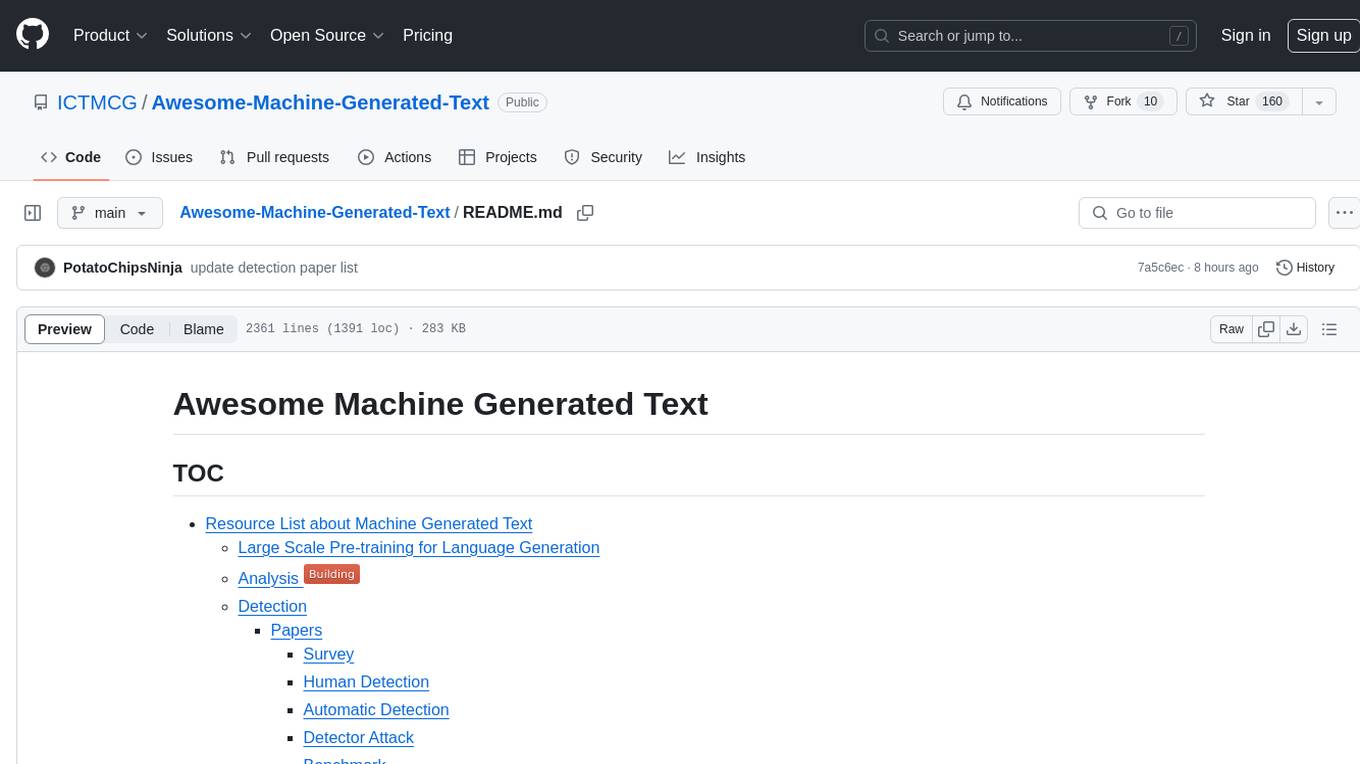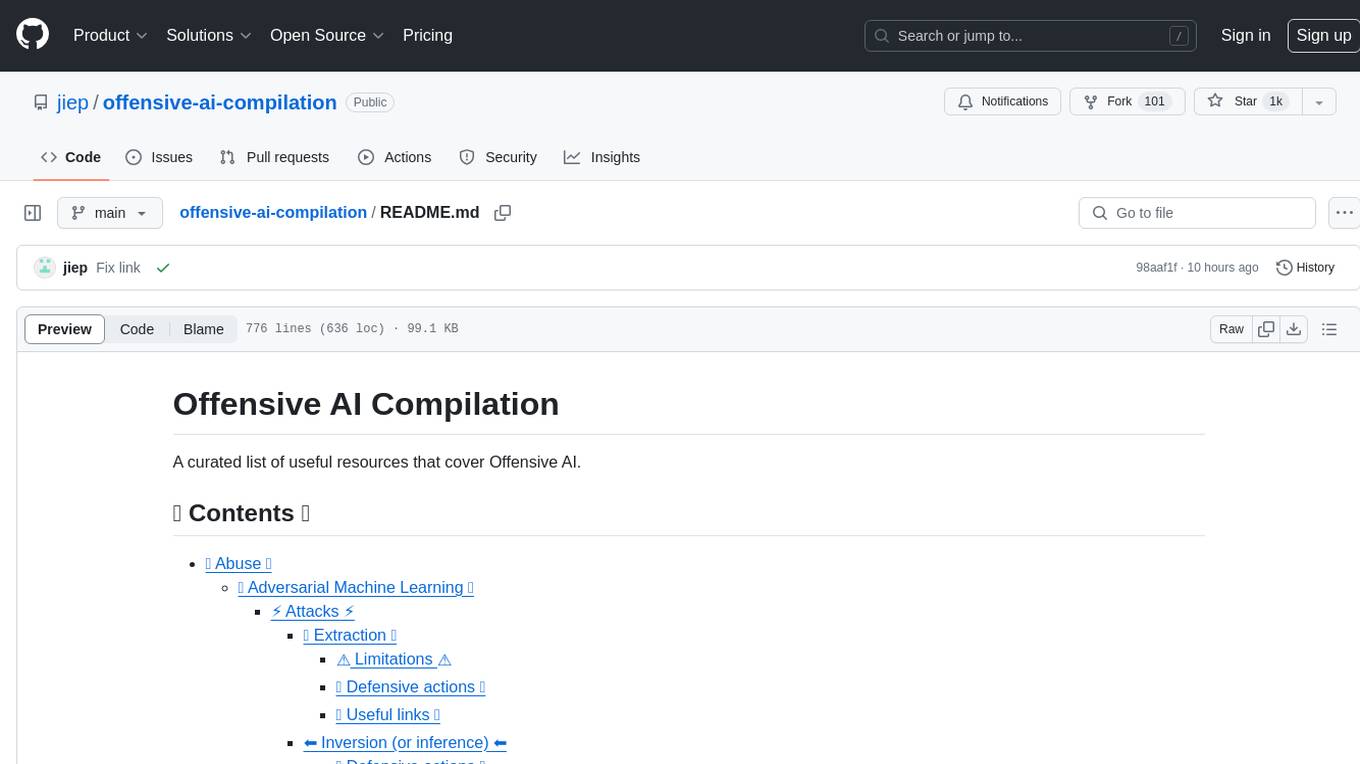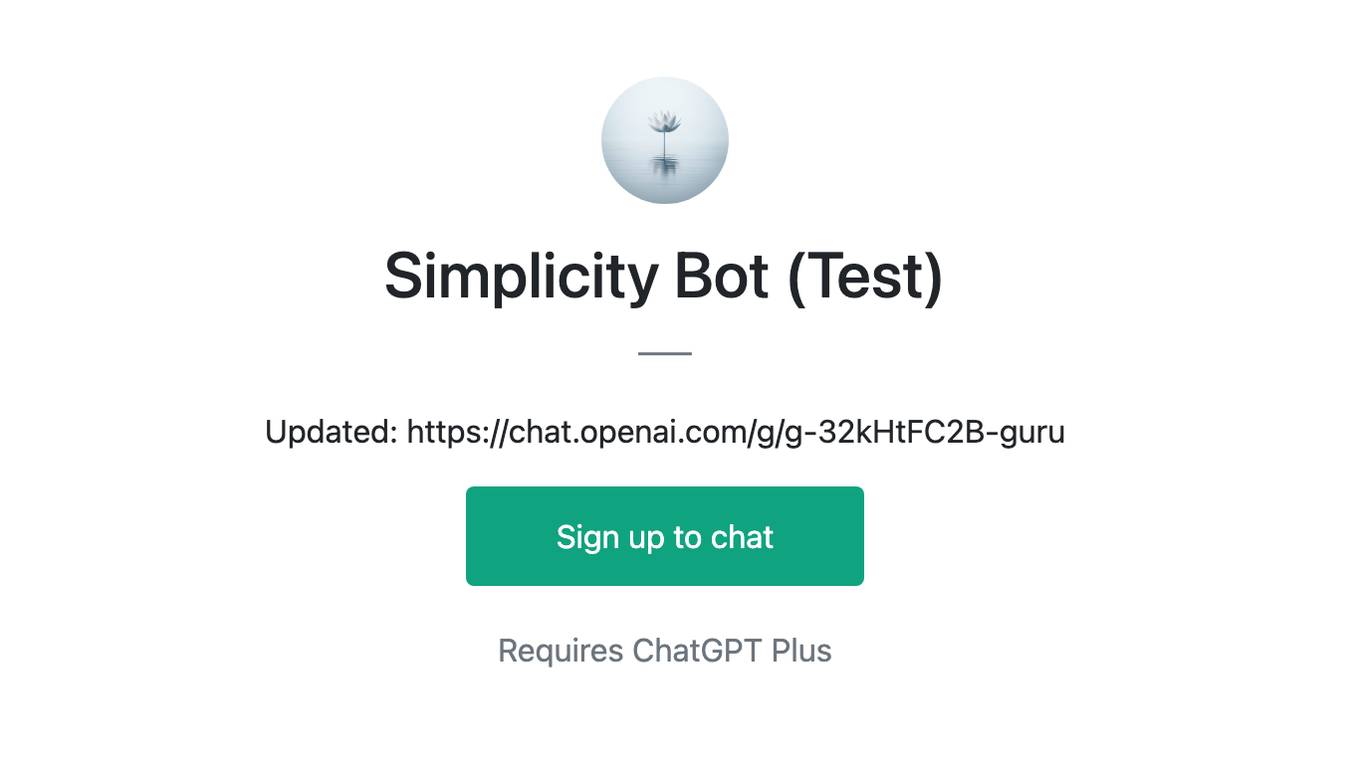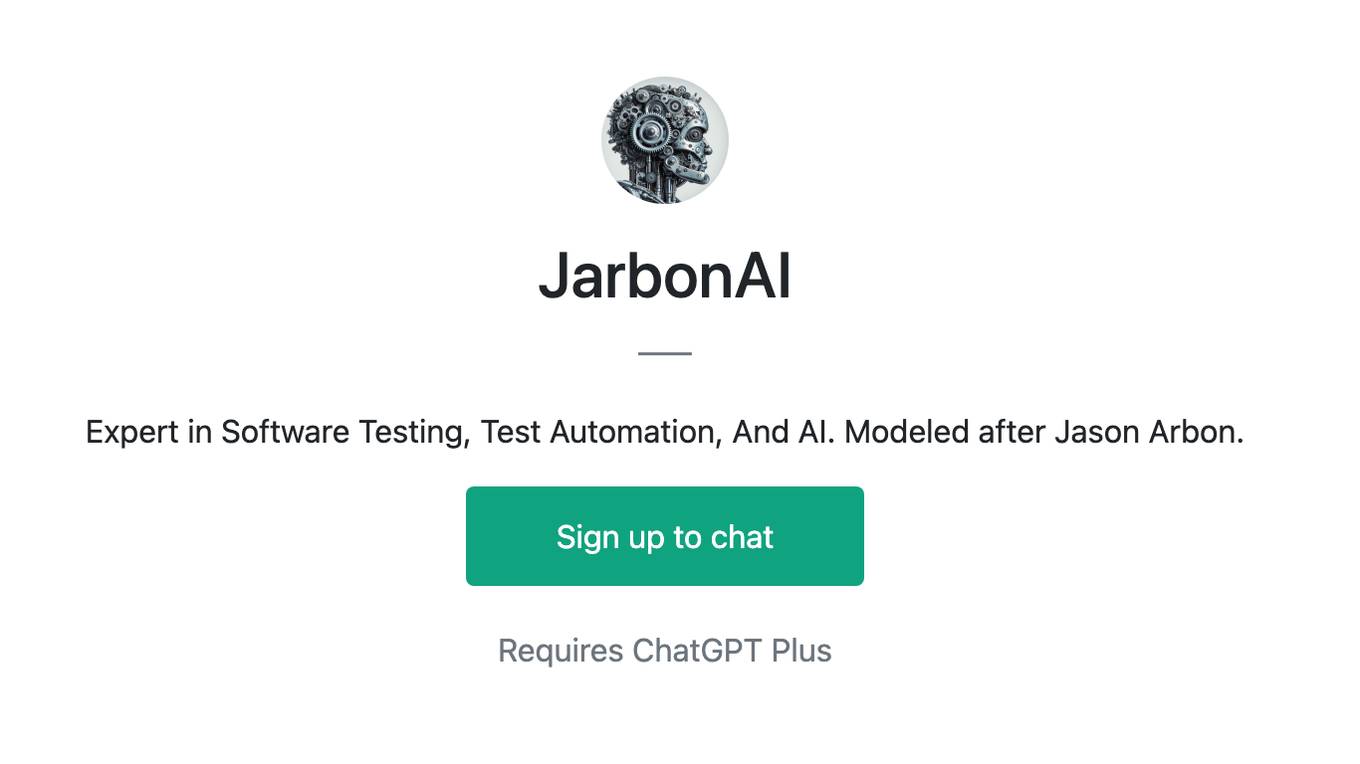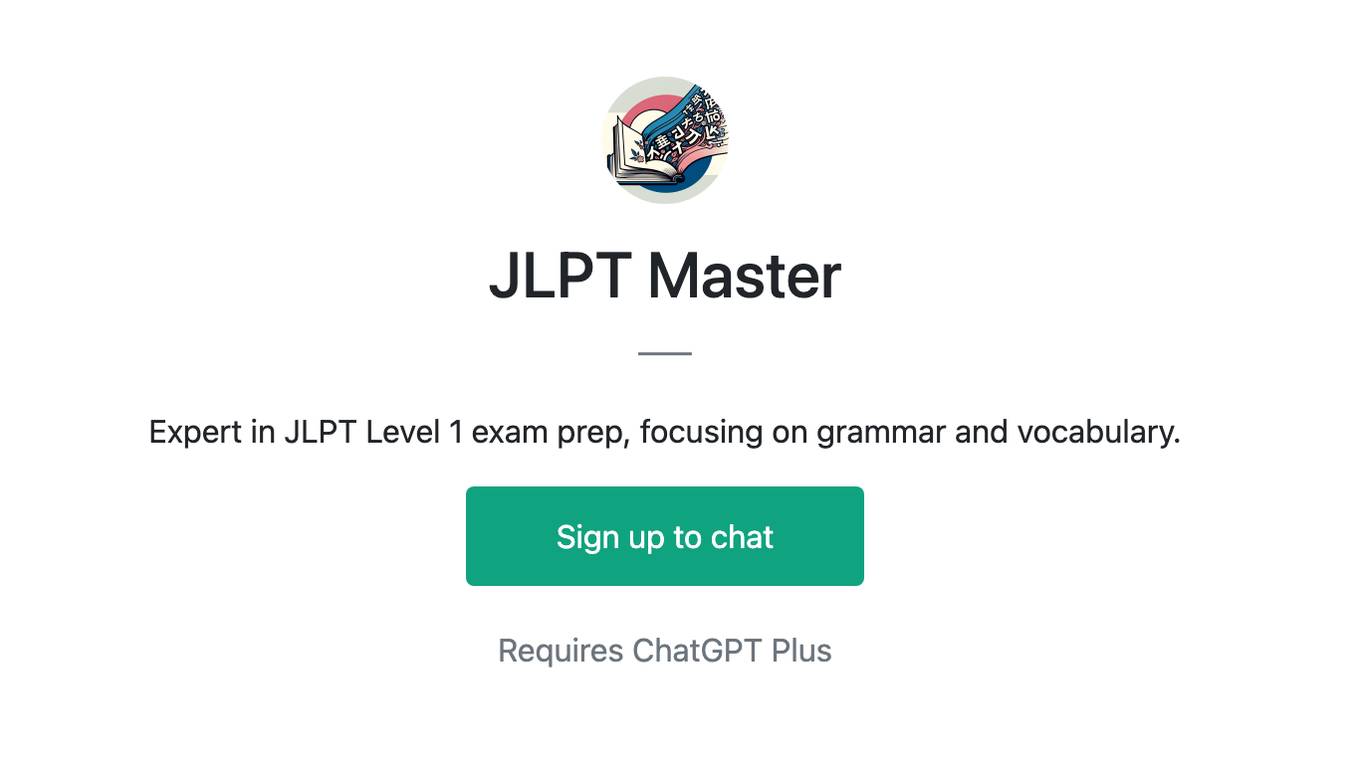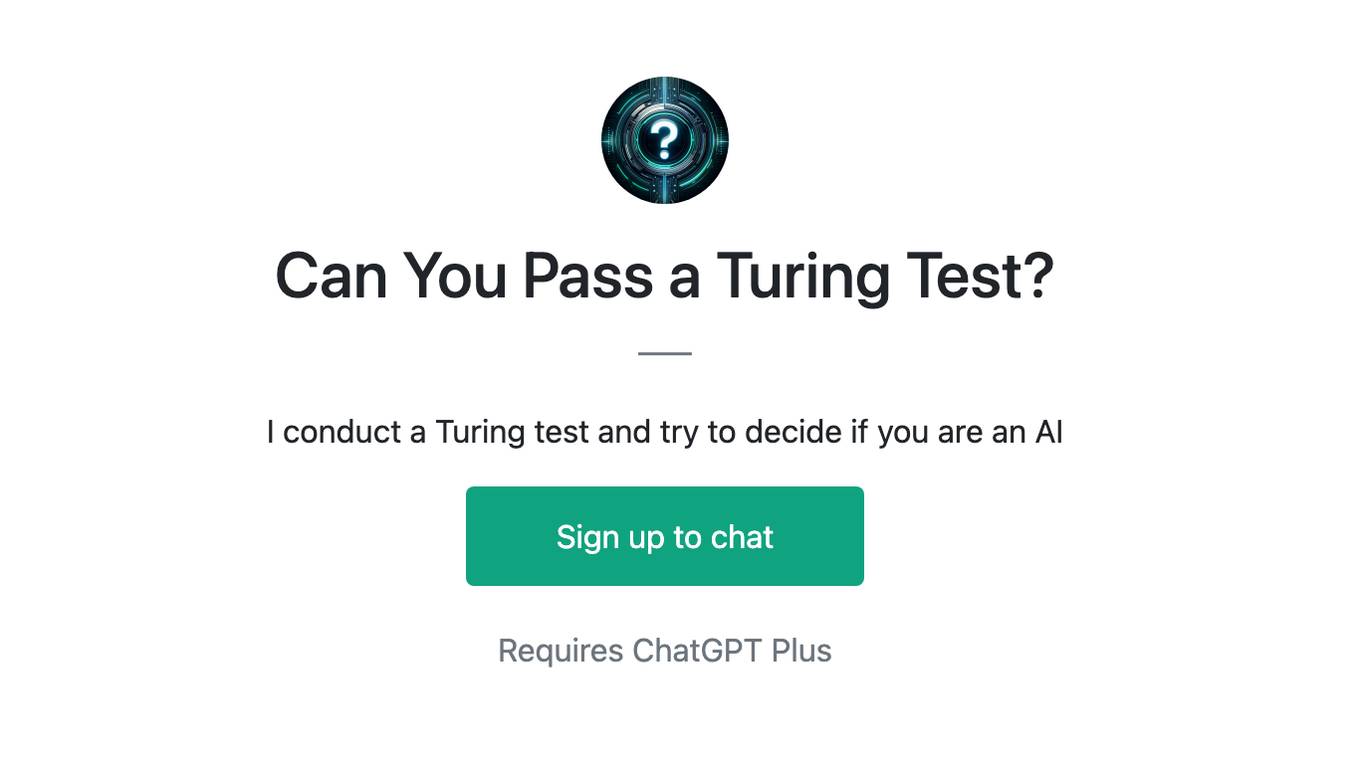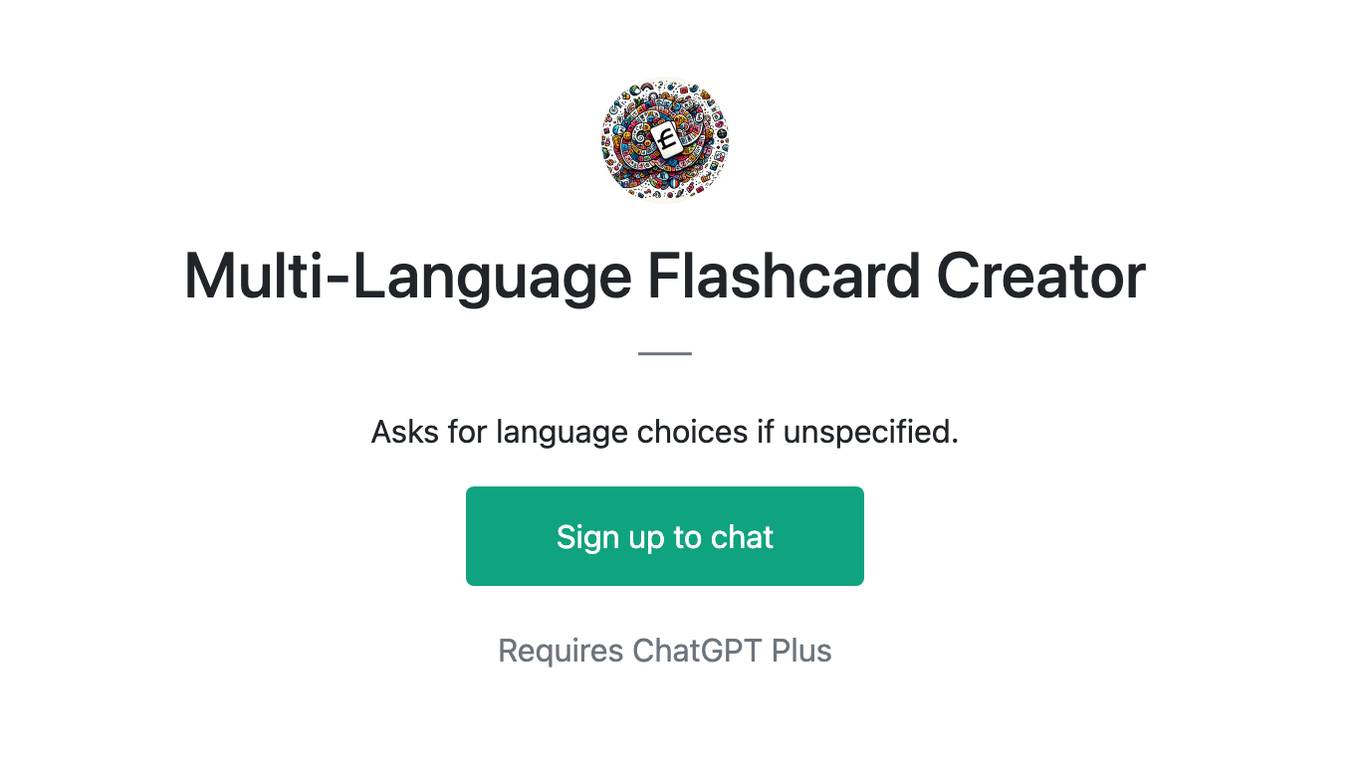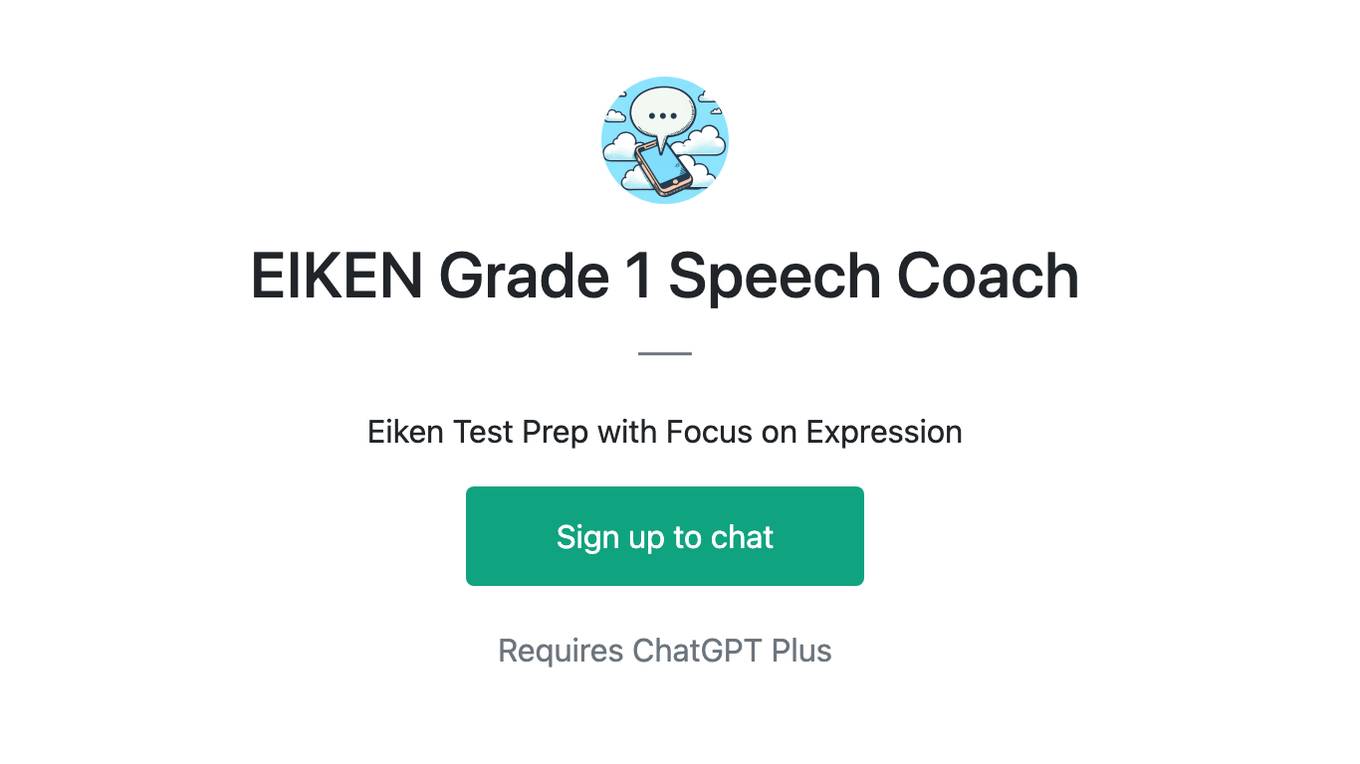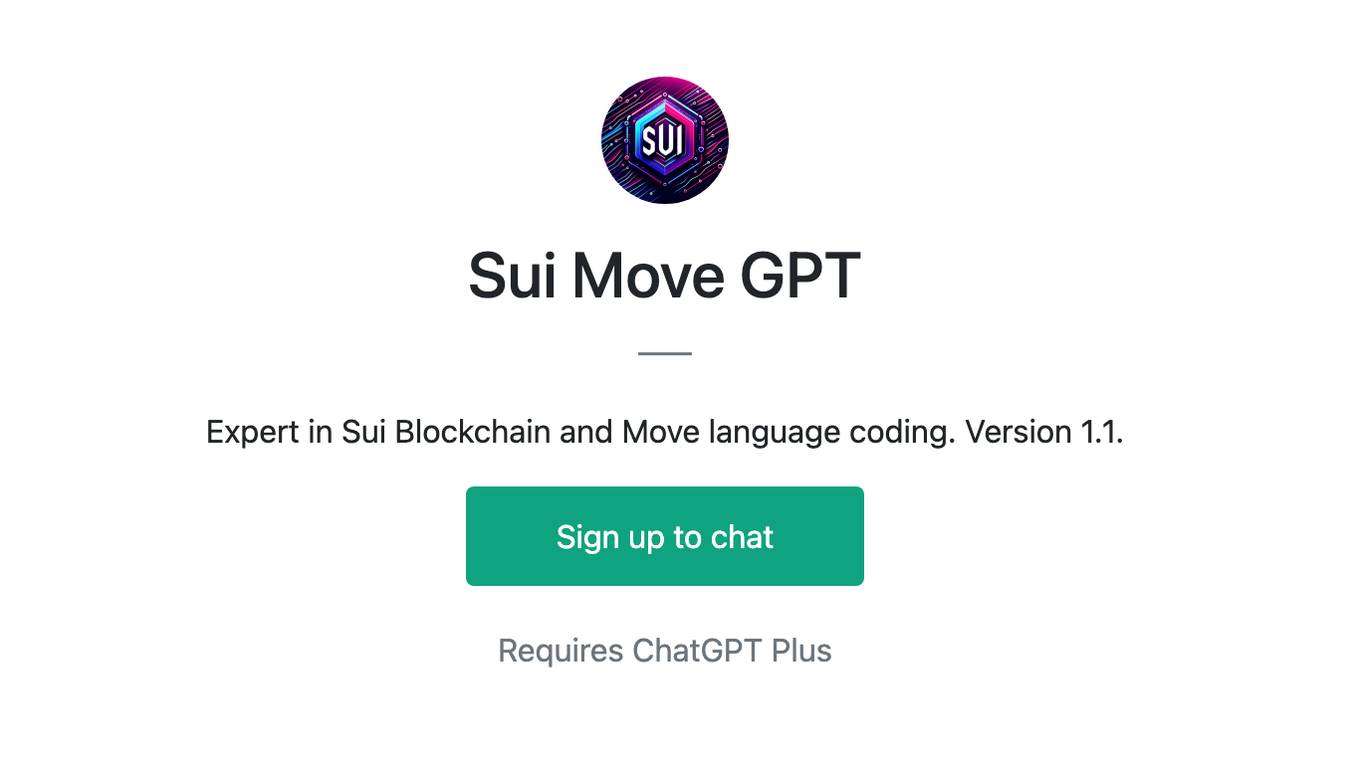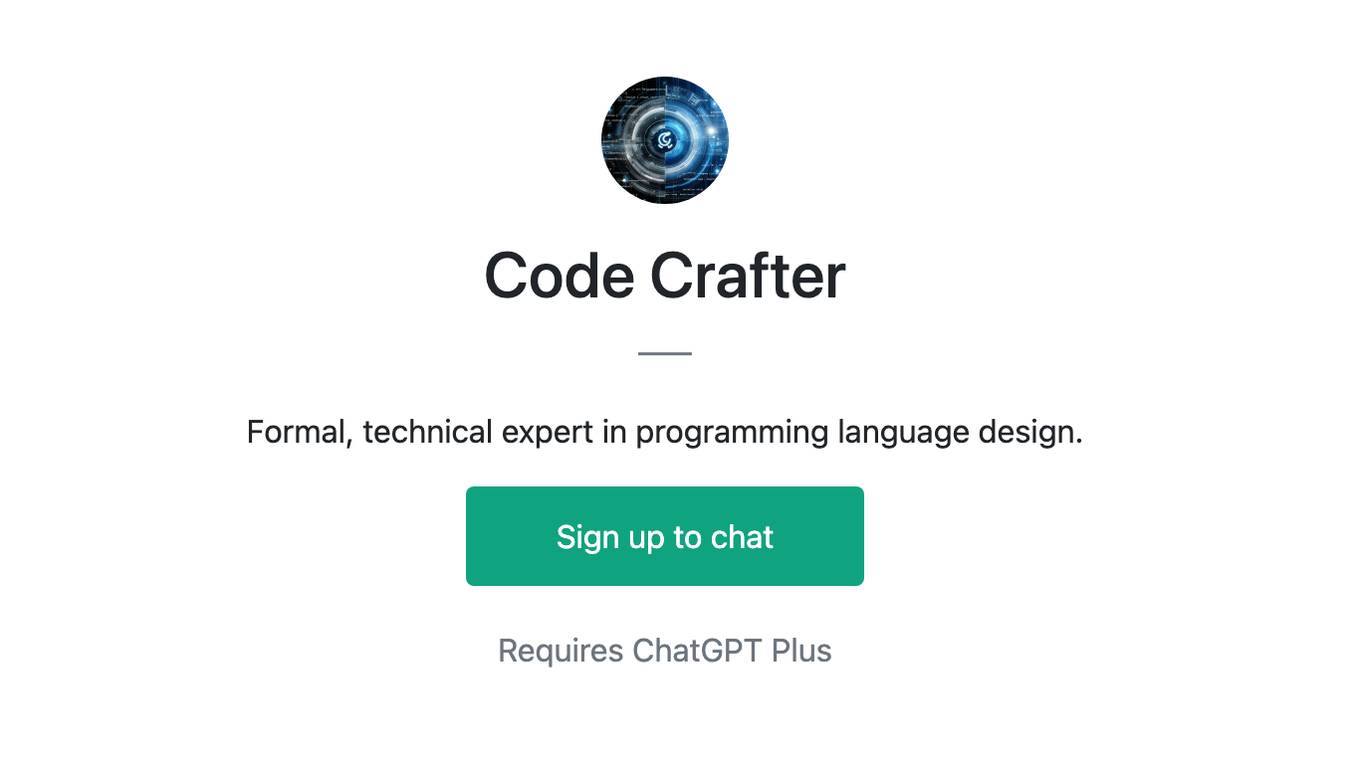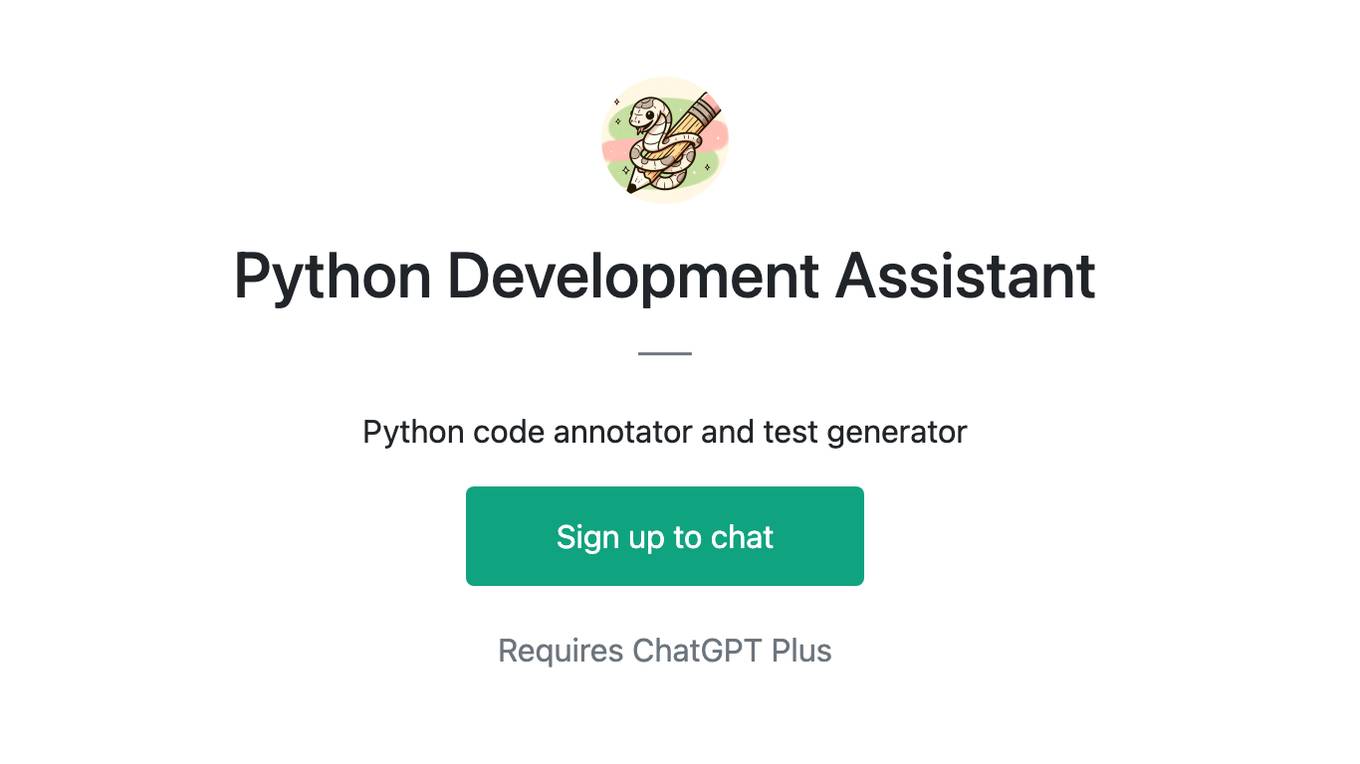Best AI tools for< test language models >
20 - AI tool Sites
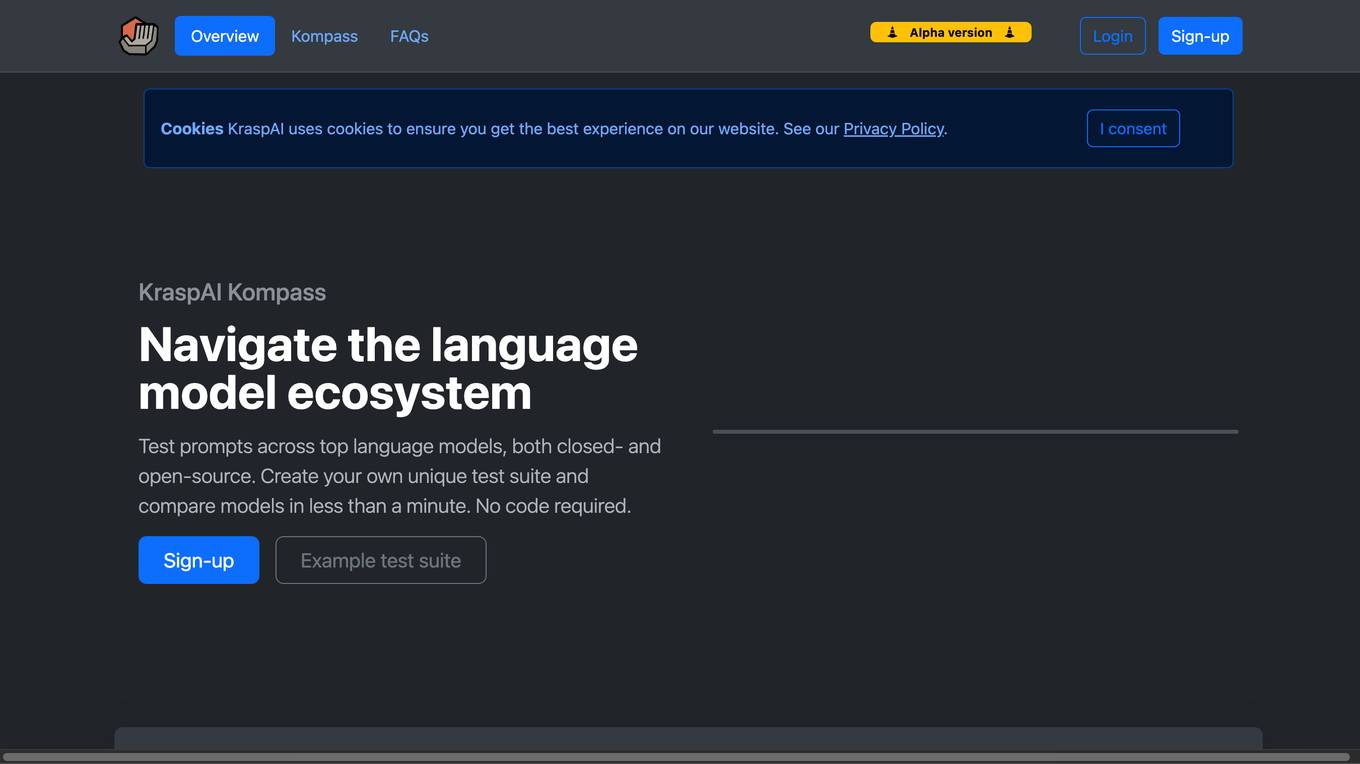
KraspAI Kompass
KraspAI Kompass is a tool that allows users to test prompts across top language models, both closed- and open-source. Users can create their own unique test suite and compare models in less than a minute, with no code required. KraspAI Kompass is a valuable tool for developers and researchers who want to evaluate the performance of different language models.
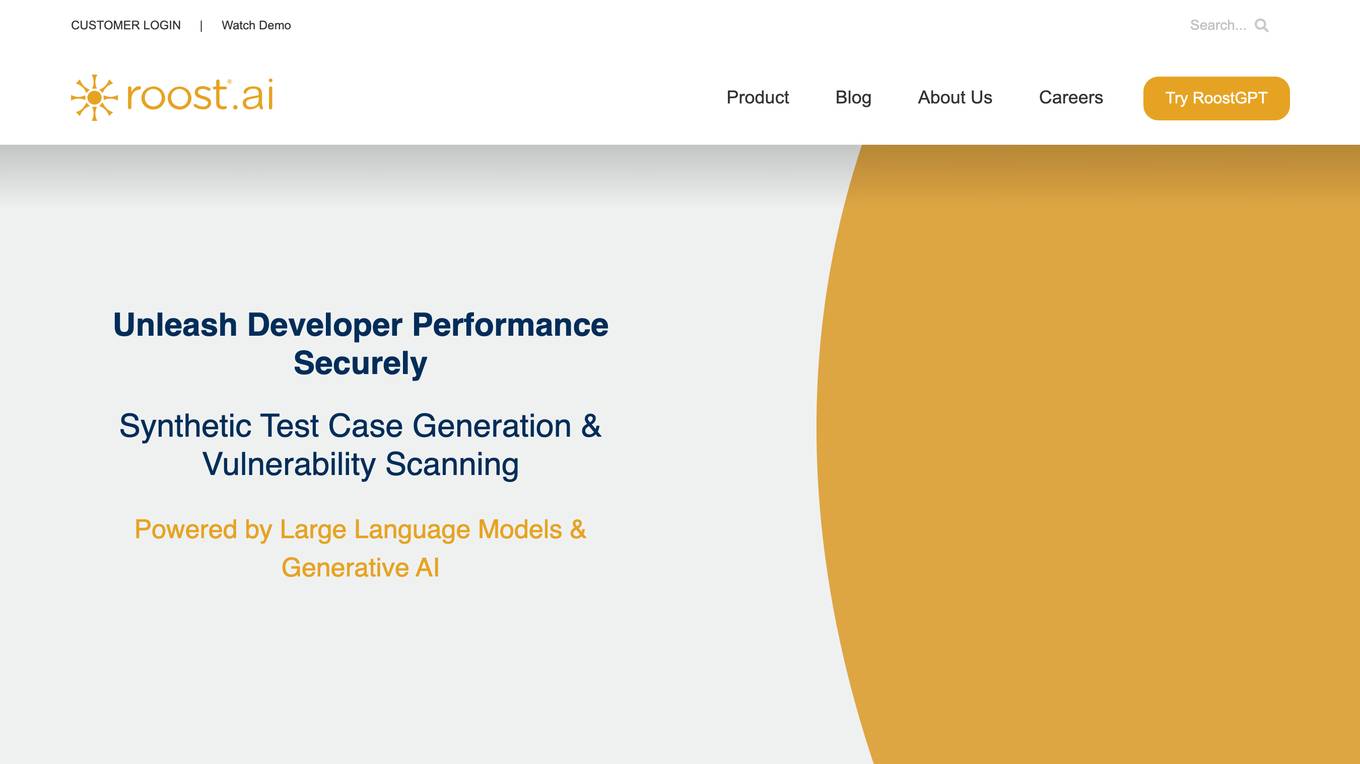
Roost.ai
Roost.ai is an AI-driven testing copilot that offers automated test case generation and code scanning services. Powered by large language models and generative AI, Roost.ai helps in building reliable software by ensuring 100% test coverage every single time. The platform automates test case generation, freeing up developer time and elevating test accuracy and coverage by identifying overlooked edge cases. Roost.ai accelerates time to market by slashing testing time and assisting in timely project releases. Customers can unlock developer potential by escaping test generation drudgery and focusing on coding and innovation.
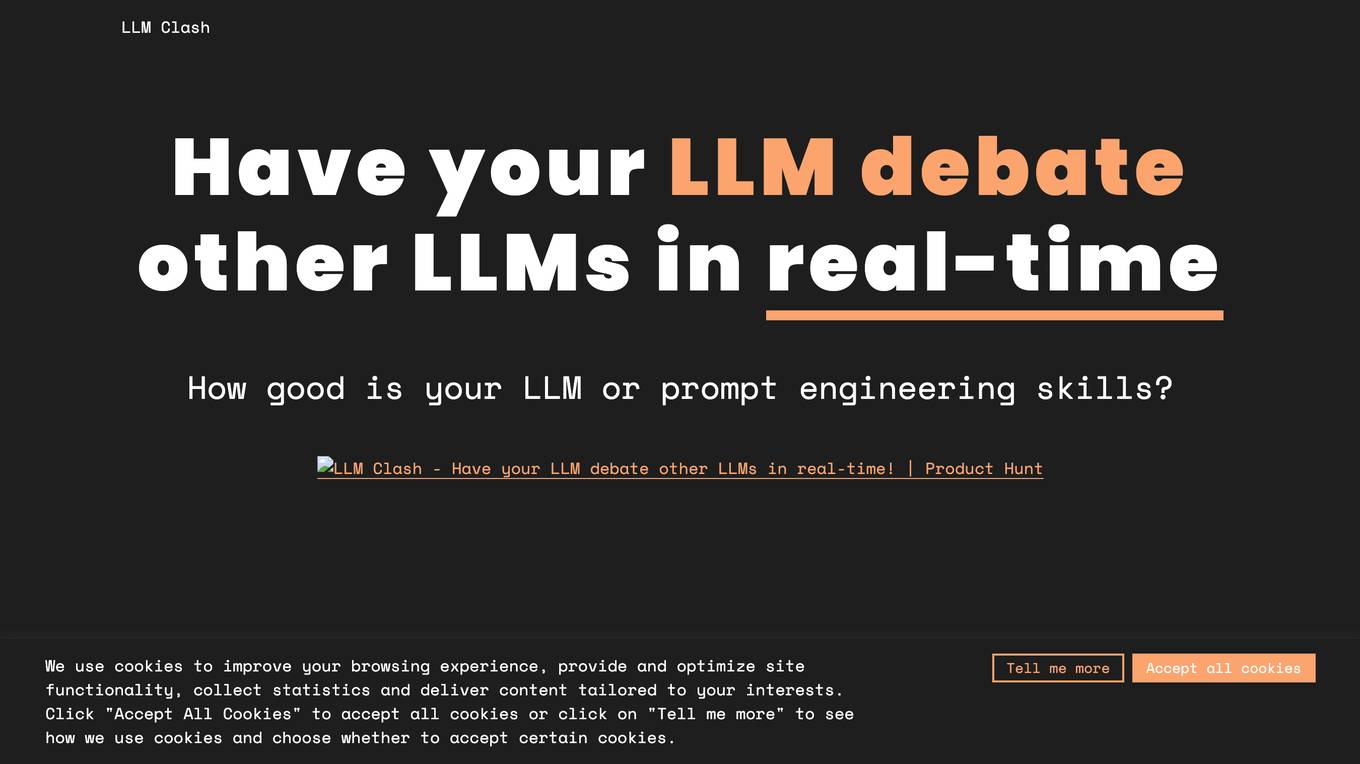
LLM Clash
LLM Clash is a web-based application that allows users to compare the outputs of different large language models (LLMs) on a given task. Users can input a prompt and select which LLMs they want to compare. The application will then display the outputs of the LLMs side-by-side, allowing users to compare their strengths and weaknesses.

Cameron Jones
Cameron Jones is an AI tool developed by a Cognitive Science PhD student at UCSD. The tool focuses on social intelligence in humans and Large Language Models (LLMs). It analyzes LLM performance on tasks such as the False Belief task, other theory of mind tasks, and the Turing test. The tool also compares humans and LLMs on an Experimental Protocol Inventory for Theory of Mind Evaluation (EPITOME). Cameron Jones aims to explore the capabilities and limitations of LLMs in understanding human behavior and social interactions.
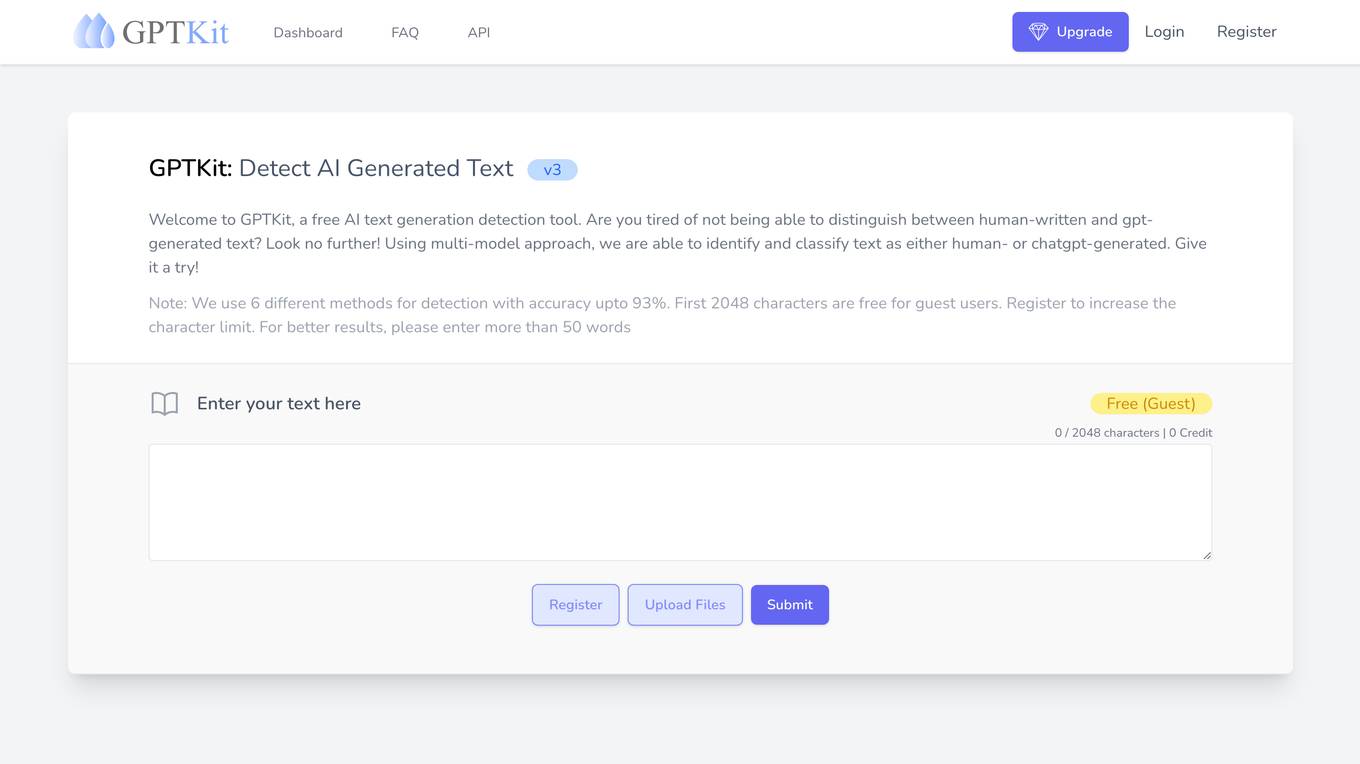
GPTKit
GPTKit is a free AI text generation detection tool that utilizes six different AI-based content detection techniques to identify and classify text as either human- or AI-generated. It provides reports on the authenticity and reality of the analyzed content, with an accuracy of approximately 93%. The first 2048 characters in every request are free, and users can register for free to get 2048 characters/request.

Langtail
Langtail is a platform that helps developers build, test, and deploy AI-powered applications. It provides a suite of tools to help developers debug prompts, run tests, and monitor the performance of their AI models. Langtail also offers a community forum where developers can share tips and tricks, and get help from other users.
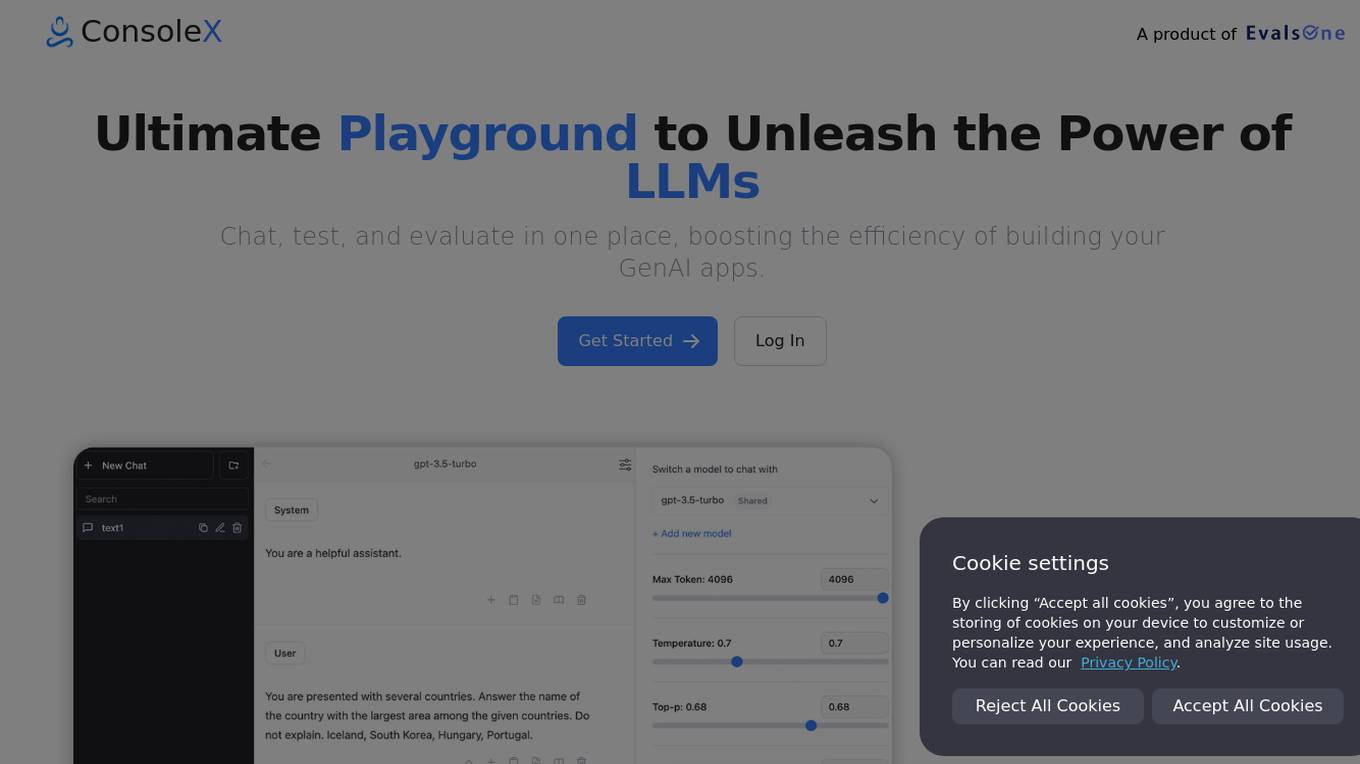
ConsoleX
ConsoleX is an advanced AI tool that offers a wide range of functionalities to unlock infinite possibilities in the field of artificial intelligence. It provides users with a powerful platform to develop, test, and deploy AI models with ease. With cutting-edge features and intuitive interface, ConsoleX is designed to cater to the needs of both beginners and experts in the AI domain. Whether you are a data scientist, researcher, or developer, ConsoleX empowers you to explore the full potential of AI technology and drive innovation in your projects.

Vellum
Vellum is a low-code platform that helps developers build and deploy AI applications powered by large language models (LLMs) like GPT-3 and Codex. With Vellum, developers can quickly prototype, test, and deploy AI applications without having to write any code. Vellum provides a variety of tools and features to help developers build AI applications, including a prompt engineering tool, a workflow editor, an evaluation tool, and a deployment tool. Vellum also provides a library of pre-built AI applications that developers can use as a starting point for their own projects.
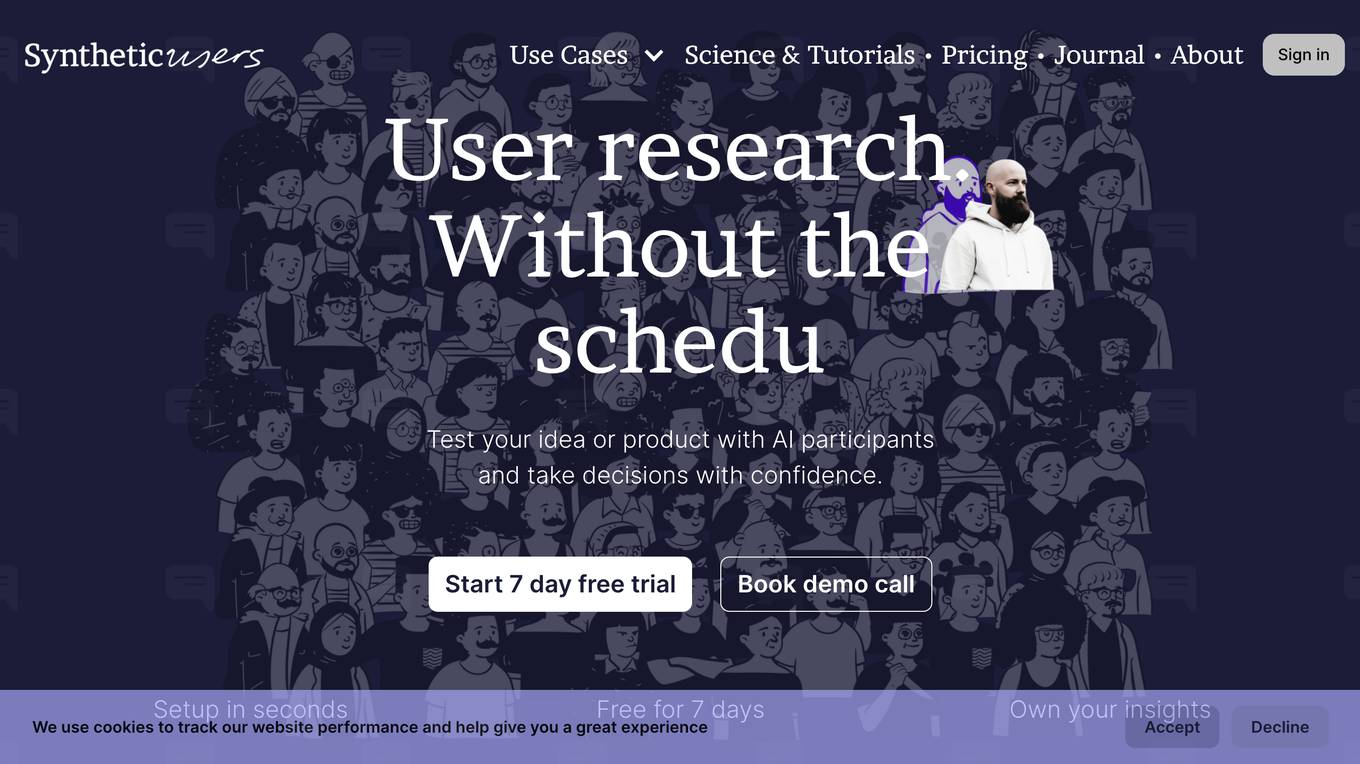
Synthetic Users
Synthetic Users is an AI-powered user research tool that allows users to conduct user research without the traditional challenges and headaches. The platform leverages advanced AI architecture to create accurate synthetic interviews and surveys, enabling users to gain valuable insights for various applications. Synthetic Users uses the power of Large Language Models (LLMs) to generate human-like AI participants with high Synthetic Organic Parity, ensuring relevant and reflective data. The tool offers a multi-agent architecture for dynamic interactions, continuous learning, and adaptation, mimicking real human behaviors. Users can run problem exploration interviews, concept testing interviews, and enrich their own Synthetic Users with proprietary data. With a focus on enhancing user satisfaction and identifying market needs, Synthetic Users provides a complete suite of research solutions for product discovery, marketing, and growth.
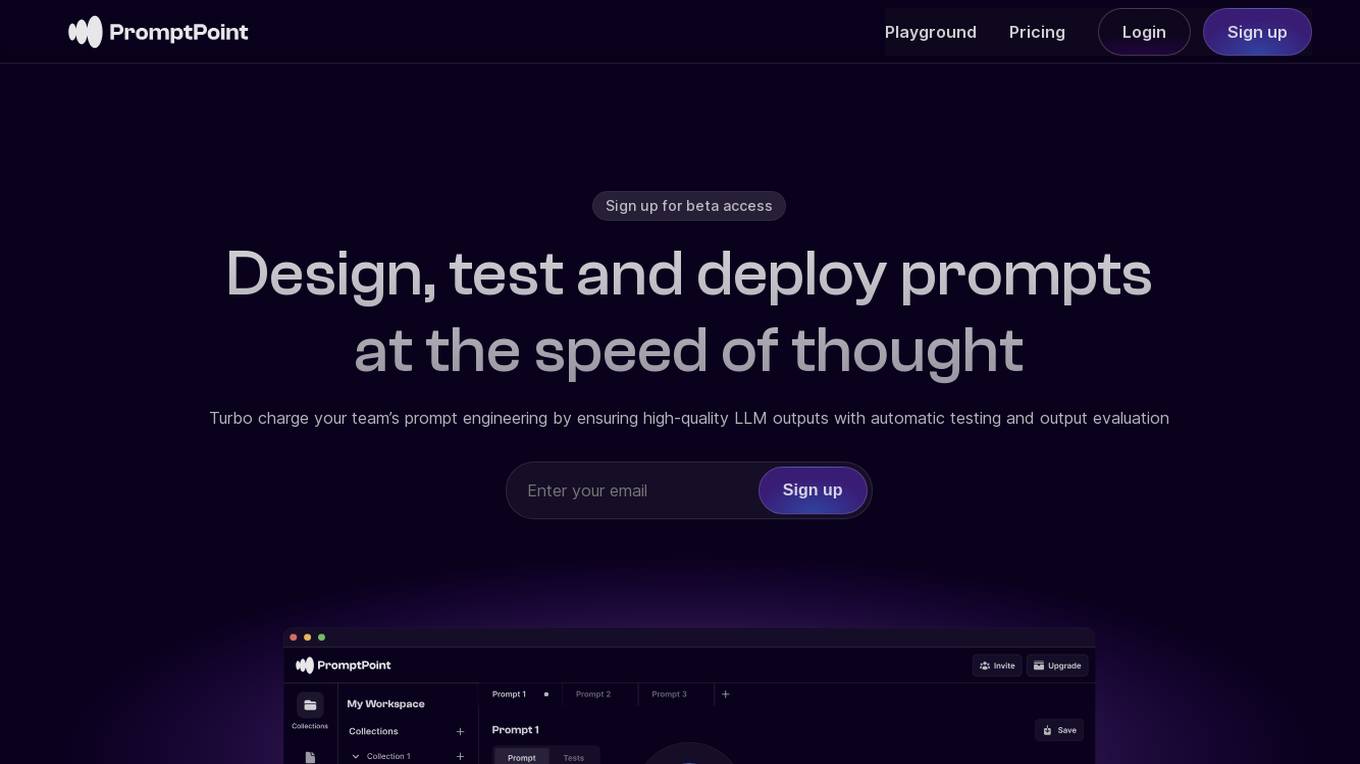
PromptPoint Playground
PromptPoint Playground is an AI tool designed to help users design, test, and deploy prompts quickly and efficiently. It enables teams to create high-quality LLM outputs through automatic testing and evaluation. The platform allows users to make non-deterministic prompts predictable, organize prompt configurations, run automated tests, and monitor usage. With a focus on collaboration and accessibility, PromptPoint Playground empowers both technical and non-technical users to leverage the power of large language models for prompt engineering.

LLMChess
LLMChess is a web-based chess game that utilizes large language models (LLMs) to power the gameplay. Players can select the LLM model they wish to play against, and the game will commence once the "Start" button is clicked. The game logs are displayed in a black-bordered pane on the right-hand side of the screen. LLMChess is compatible with the Google Chrome browser. For more information on the game's functionality and participation guidelines, please refer to the provided link.
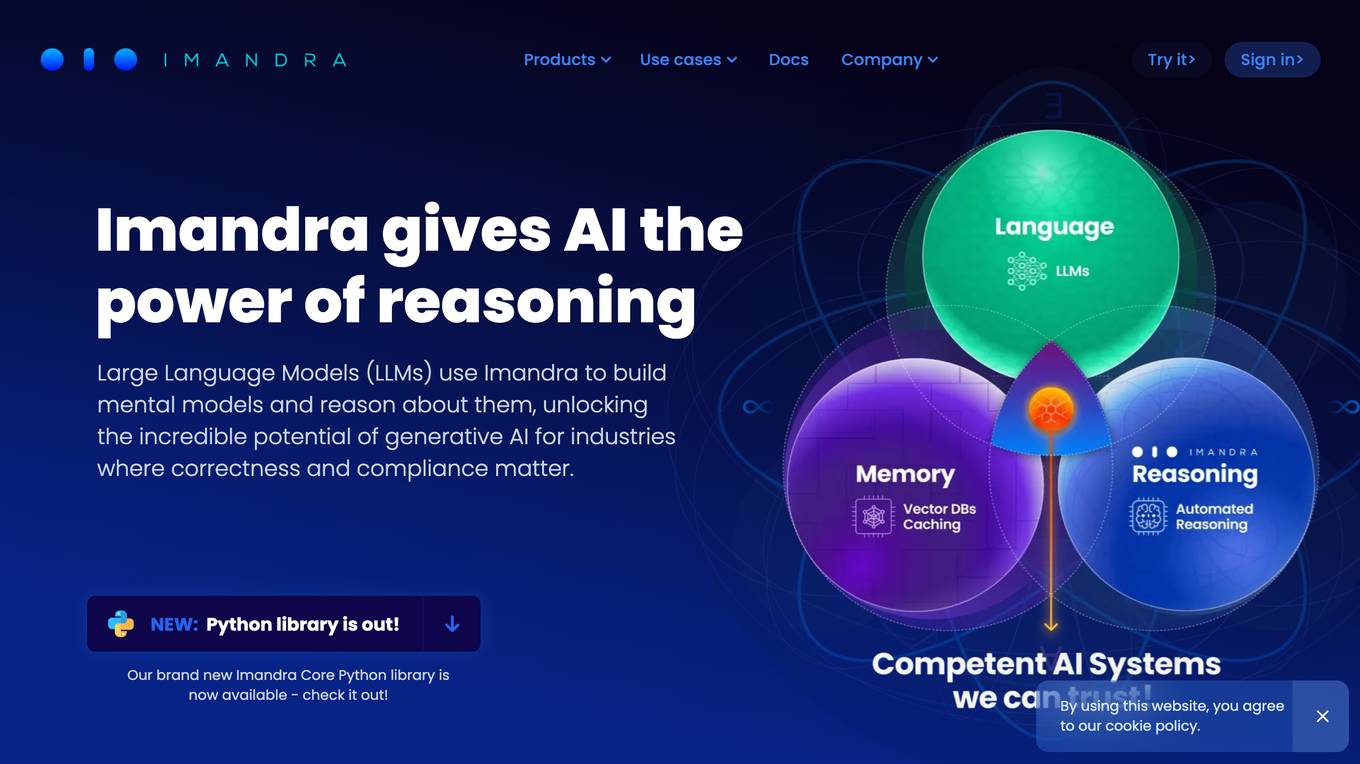
Imandra
Imandra is a company that provides automated logical reasoning for Large Language Models (LLMs). Imandra's technology allows LLMs to build mental models and reason about them, unlocking the potential of generative AI for industries where correctness and compliance matter. Imandra's platform is used by leading financial firms, the US Air Force, and DARPA.

Confident AI
Confident AI is an open-source evaluation infrastructure for Large Language Models (LLMs). It provides a centralized platform to judge LLM applications, ensuring substantial benefits and addressing any weaknesses in LLM implementation. With Confident AI, companies can define ground truths to ensure their LLM is behaving as expected, evaluate performance against expected outputs to pinpoint areas for iterations, and utilize advanced diff tracking to guide towards the optimal LLM stack. The platform offers comprehensive analytics to identify areas of focus and features such as A/B testing, evaluation, output classification, reporting dashboard, dataset generation, and detailed monitoring to help productionize LLMs with confidence.
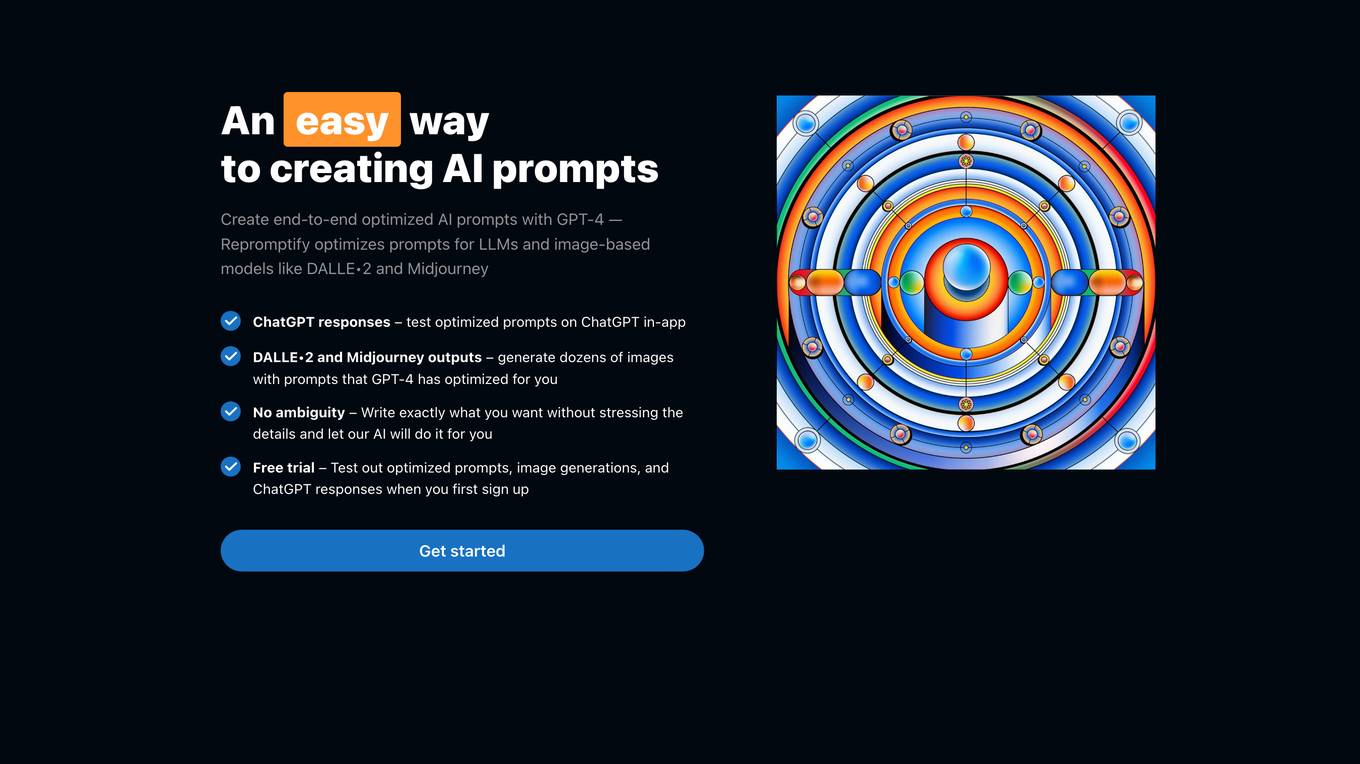
Reprompt
Repromt is an AI-powered tool that helps users create optimized prompts for large language models (LLMs) like GPT-4 and image-based models like DALLE•2 and Midjourney. With Reprompt, users can write exactly what they want without worrying about the details, and the AI will do the rest. Reprompt offers a free trial so users can test out optimized prompts, image generations, and ChatGPT responses before committing to a subscription.
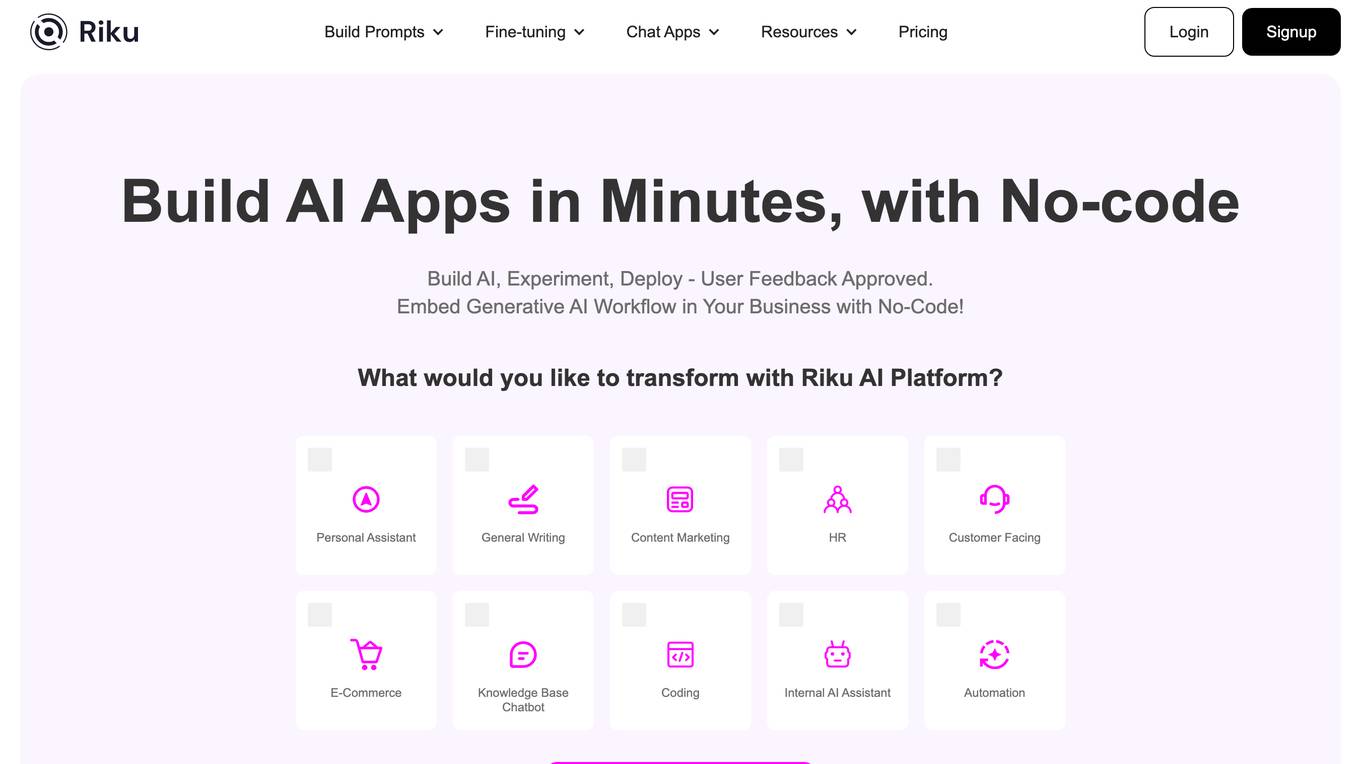
Riku
Riku is a no-code platform that allows users to build and deploy powerful generative AI for their business. With access to over 40 industry-leading LLMs, users can easily test different prompts to find just the right one for their needs. Riku's platform also allows users to connect siloed data sources and systems together to feed into powerful AI applications. This makes it easy for businesses to automate repetitive tasks, test ideas rapidly, and get answers in real-time.
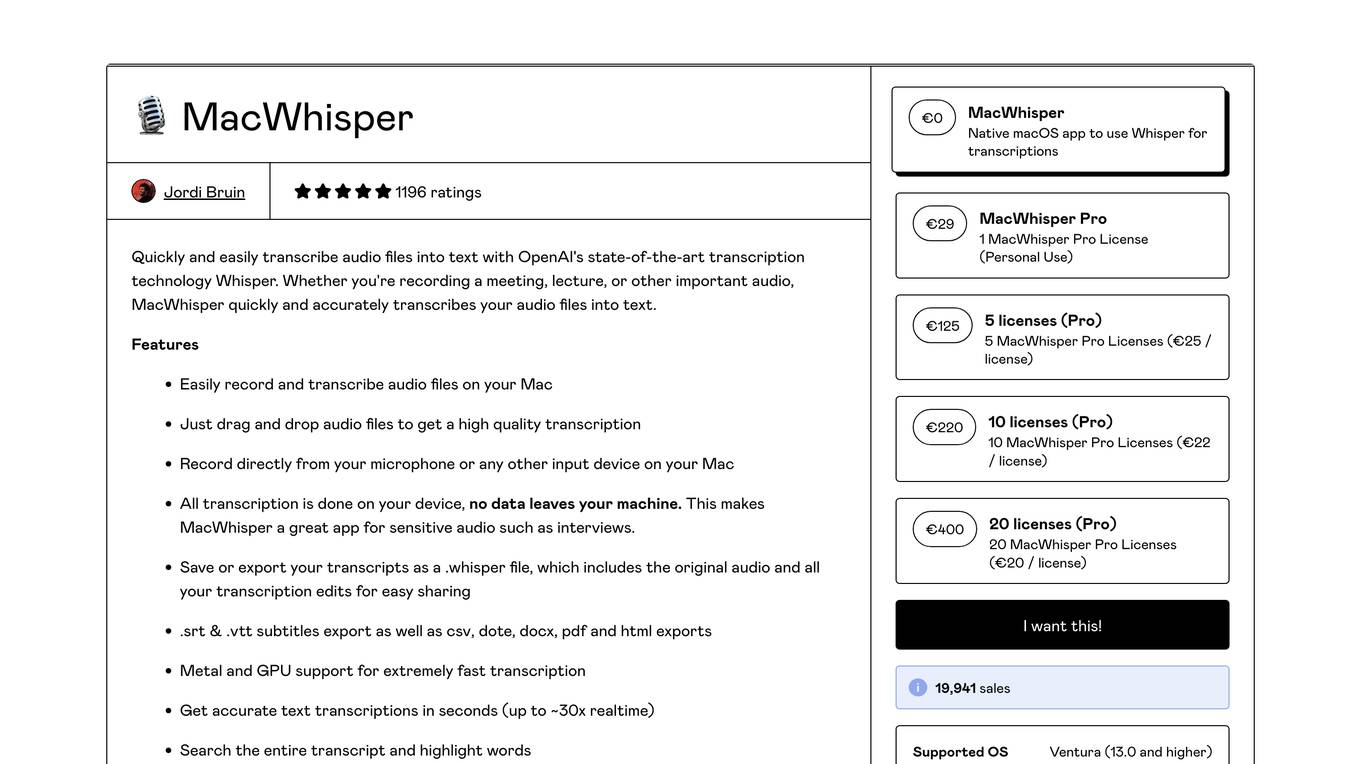
MacWhisper
MacWhisper is a native macOS application that utilizes OpenAI's Whisper technology for transcribing audio files into text. It offers a user-friendly interface for recording, transcribing, and editing audio, making it suitable for various use cases such as transcribing meetings, lectures, interviews, and podcasts. The application is designed to protect user privacy by performing all transcriptions locally on the device, ensuring that no data leaves the user's machine.
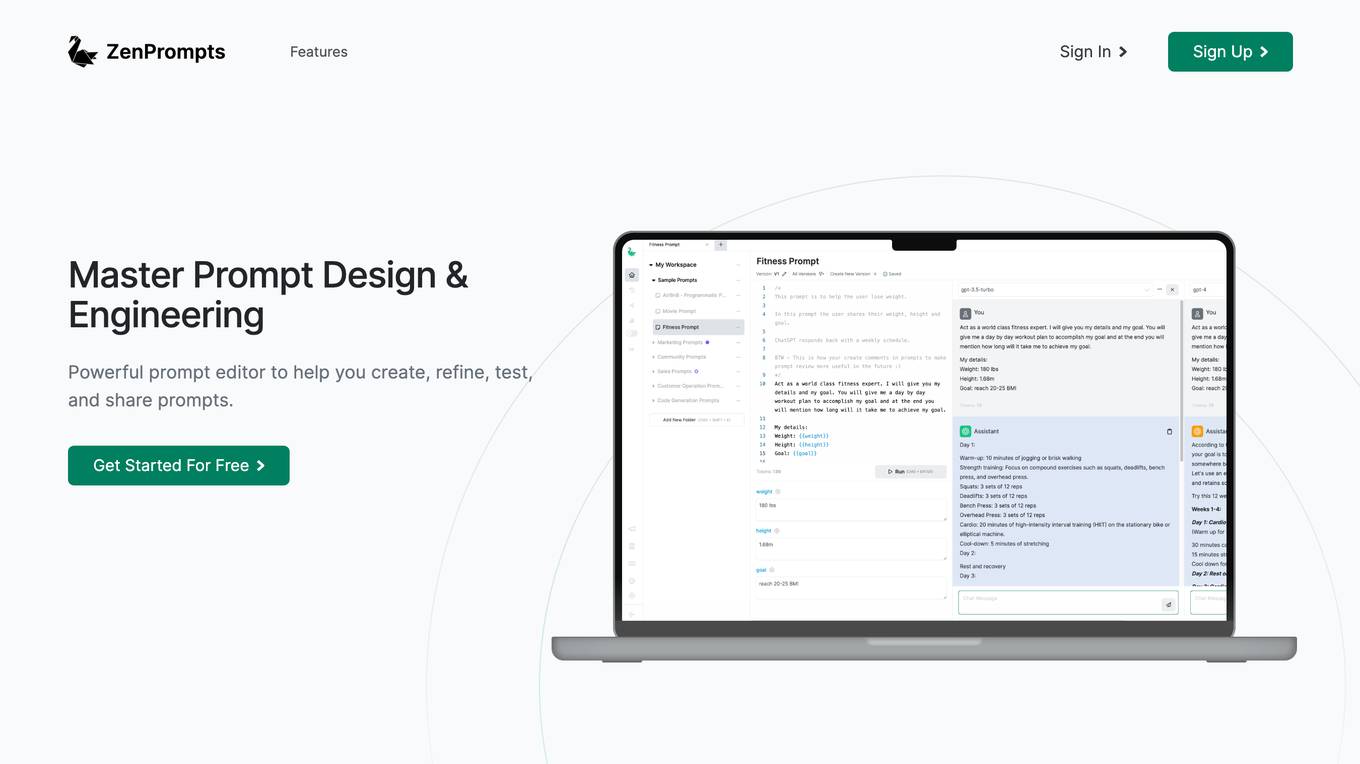
ZenPrompts
ZenPrompts is a powerful prompt editor that helps you create, refine, test, and share prompts for AI models. It offers a variety of features to make prompt engineering easier and more efficient, including the ability to compare prompts across multiple models, showcase your prompt portfolio, experiment with prompts without losing work, share prompts with others, and use dynamic variables and comments to streamline your workflow.

Plumb
Plumb is a no-code, node-based builder that empowers product, design, and engineering teams to create AI features together. It enables users to build, test, and deploy AI features with confidence, fostering collaboration across different disciplines. With Plumb, teams can ship prototypes directly to production, ensuring that the best prompts from the playground are the exact versions that go to production. It goes beyond automation, allowing users to build complex multi-tenant pipelines, transform data, and leverage validated JSON schema to create reliable, high-quality AI features that deliver real value to users. Plumb also makes it easy to compare prompt and model performance, enabling users to spot degradations, debug them, and ship fixes quickly. It is designed for SaaS teams, helping ambitious product teams collaborate to deliver state-of-the-art AI-powered experiences to their users at scale.

Freeplay
Freeplay is a tool that helps product teams experiment, test, monitor, and optimize AI features for customers. It provides a single pane of glass for the entire team, lightweight developer SDKs for Python, Node, and Java, and deployment options to meet compliance needs. Freeplay also offers best practices for the entire AI development lifecycle.
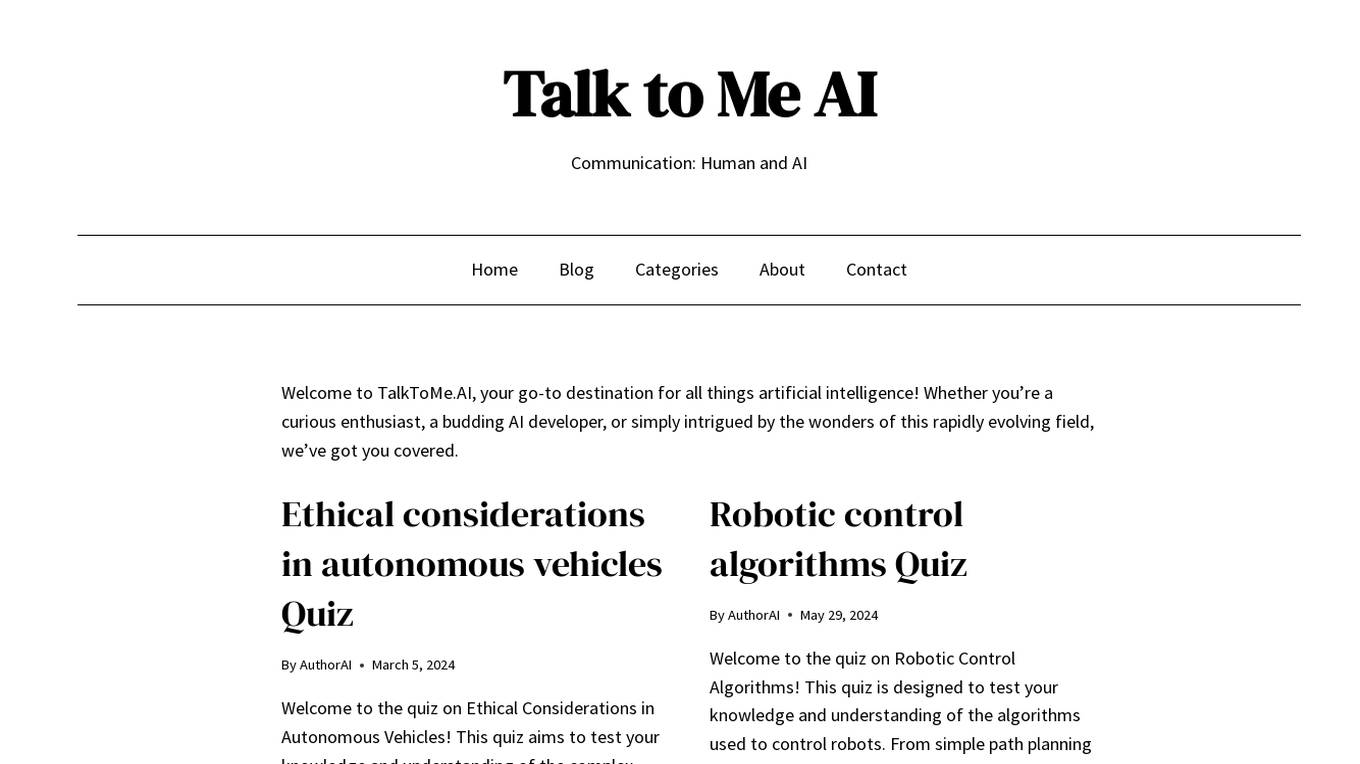
TalkToMe.AI
TalkToMe.AI is a comprehensive platform dedicated to artificial intelligence, offering a wide range of resources for enthusiasts and professionals alike. From interactive quizzes on various AI topics to in-depth articles on machine learning algorithms and neural networks, the website aims to educate and inspire individuals interested in the field of AI. With a focus on demystifying complex concepts and keeping users updated on the latest advancements, TalkToMe.AI serves as a trusted companion for anyone looking to explore the fascinating realm of artificial intelligence.
20 - Open Source AI Tools
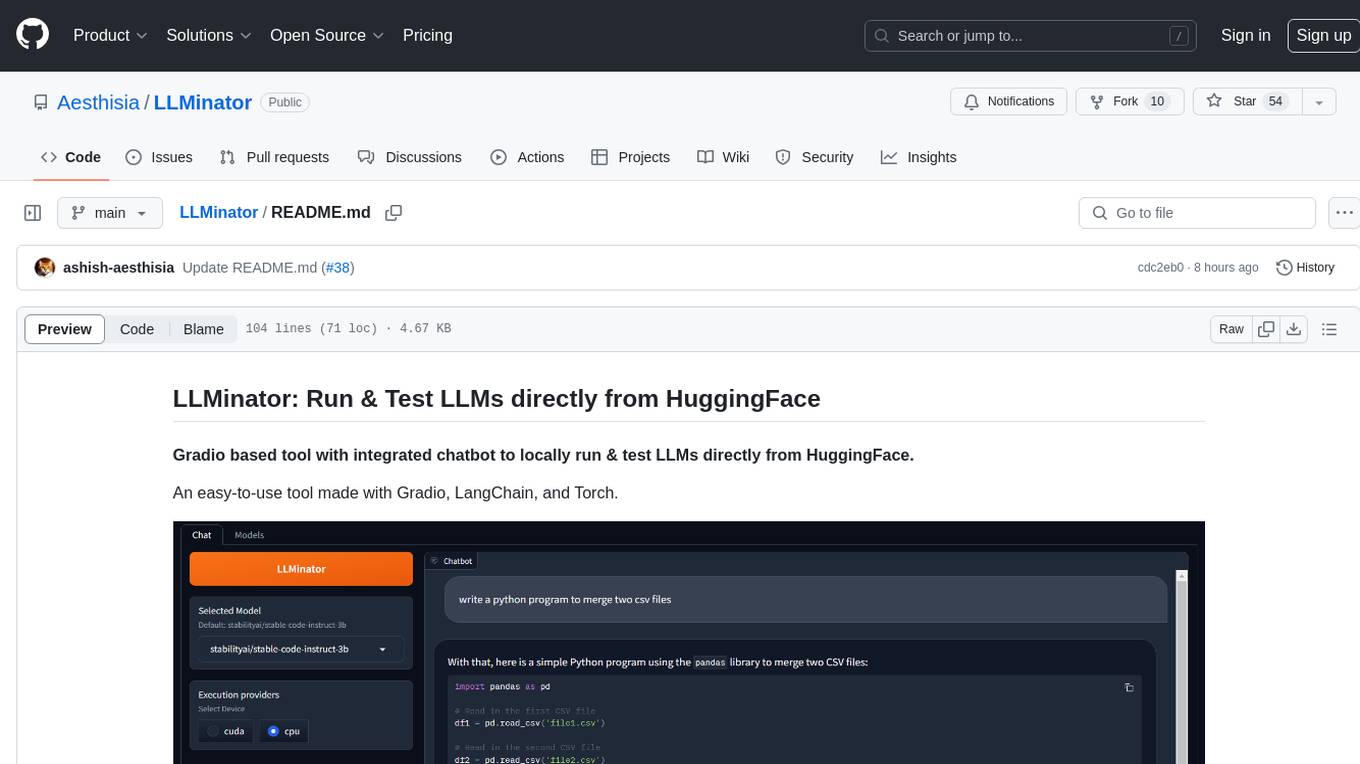
LLMinator
LLMinator is a Gradio-based tool with an integrated chatbot designed to locally run and test Language Model Models (LLMs) directly from HuggingFace. It provides an easy-to-use interface made with Gradio, LangChain, and Torch, offering features such as context-aware streaming chatbot, inbuilt code syntax highlighting, loading any LLM repo from HuggingFace, support for both CPU and CUDA modes, enabling LLM inference with llama.cpp, and model conversion capabilities.
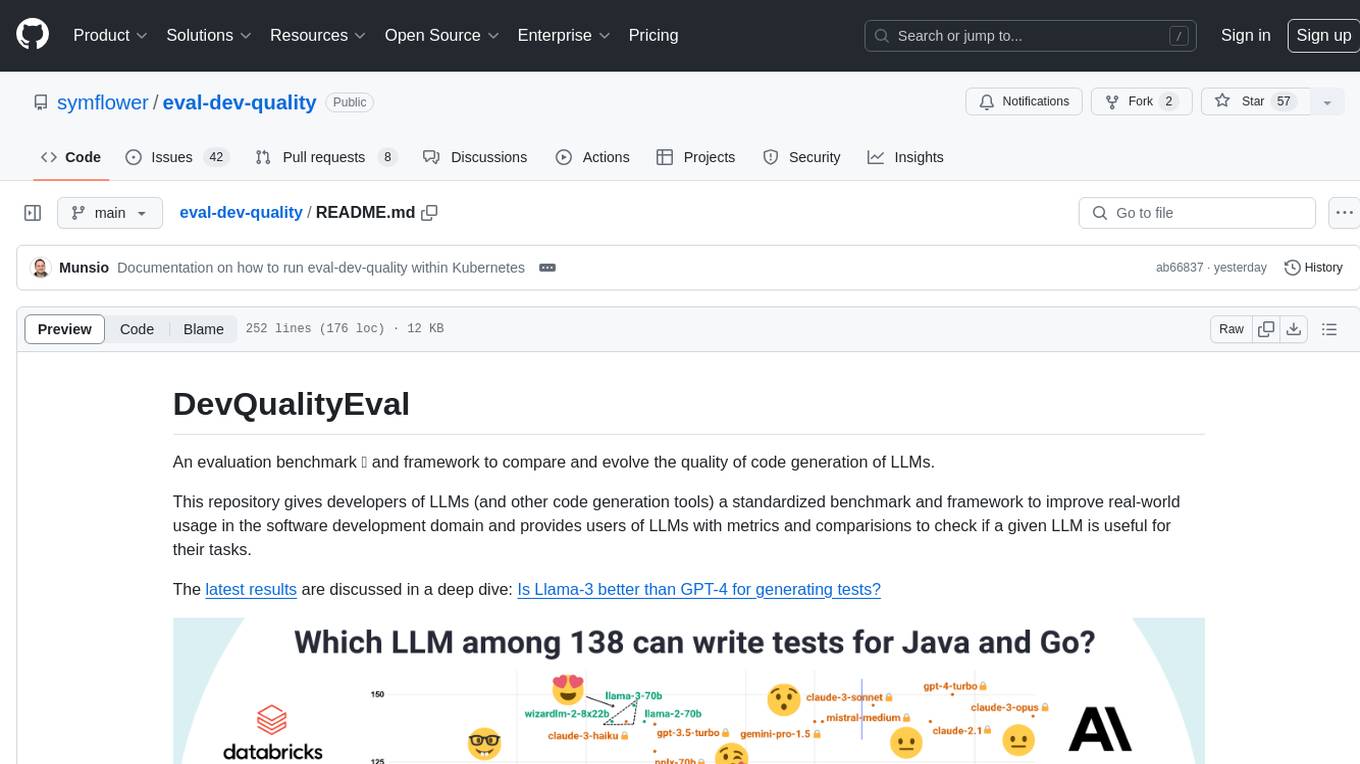
eval-dev-quality
DevQualityEval is an evaluation benchmark and framework designed to compare and improve the quality of code generation of Language Model Models (LLMs). It provides developers with a standardized benchmark to enhance real-world usage in software development and offers users metrics and comparisons to assess the usefulness of LLMs for their tasks. The tool evaluates LLMs' performance in solving software development tasks and measures the quality of their results through a point-based system. Users can run specific tasks, such as test generation, across different programming languages to evaluate LLMs' language understanding and code generation capabilities.
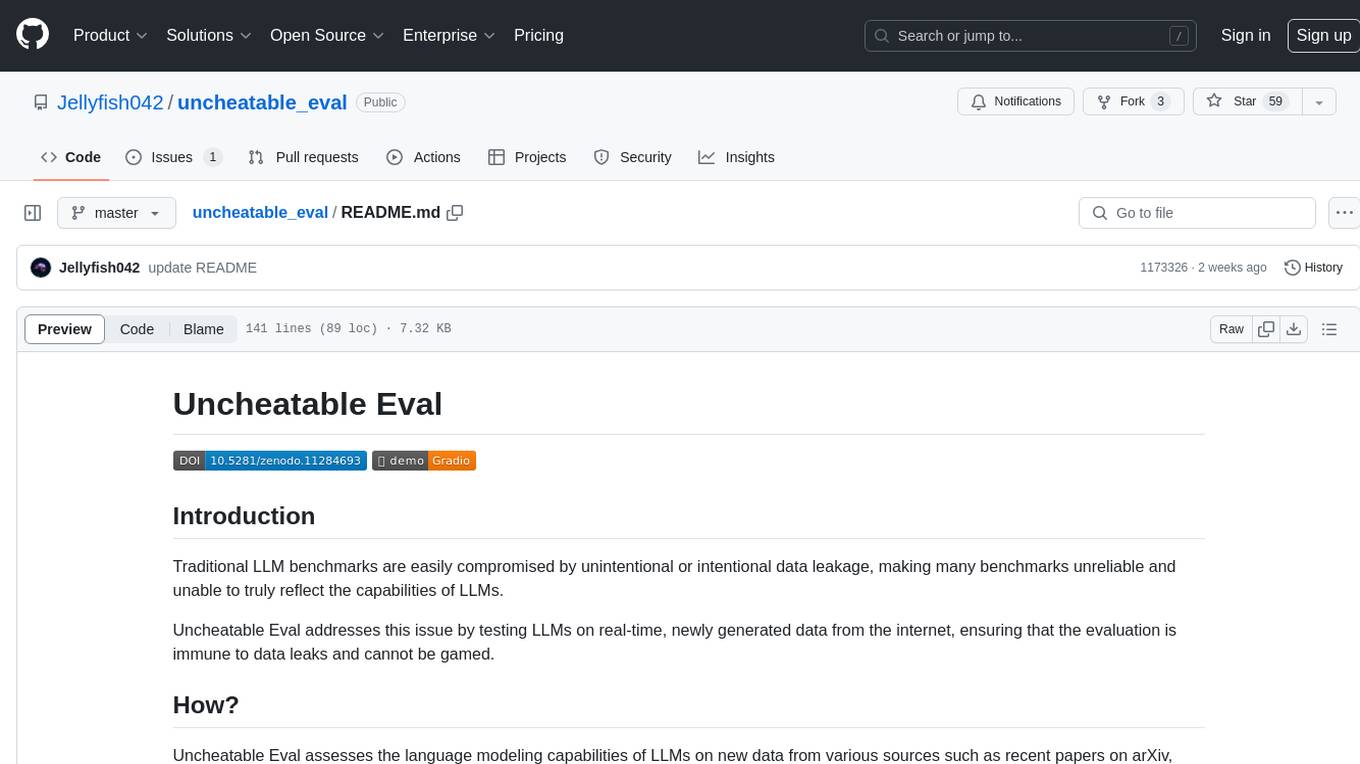
uncheatable_eval
Uncheatable Eval is a tool designed to assess the language modeling capabilities of LLMs on real-time, newly generated data from the internet. It aims to provide a reliable evaluation method that is immune to data leaks and cannot be gamed. The tool supports the evaluation of Hugging Face AutoModelForCausalLM models and RWKV models by calculating the sum of negative log probabilities on new texts from various sources such as recent papers on arXiv, new projects on GitHub, news articles, and more. Uncheatable Eval ensures that the evaluation data is not included in the training sets of publicly released models, thus offering a fair assessment of the models' performance.

llms-tools
The 'llms-tools' repository is a comprehensive collection of AI tools, open-source projects, and research related to Large Language Models (LLMs) and Chatbots. It covers a wide range of topics such as AI in various domains, open-source models, chats & assistants, visual language models, evaluation tools, libraries, devices, income models, text-to-image, computer vision, audio & speech, code & math, games, robotics, typography, bio & med, military, climate, finance, and presentation. The repository provides valuable resources for researchers, developers, and enthusiasts interested in exploring the capabilities of LLMs and related technologies.
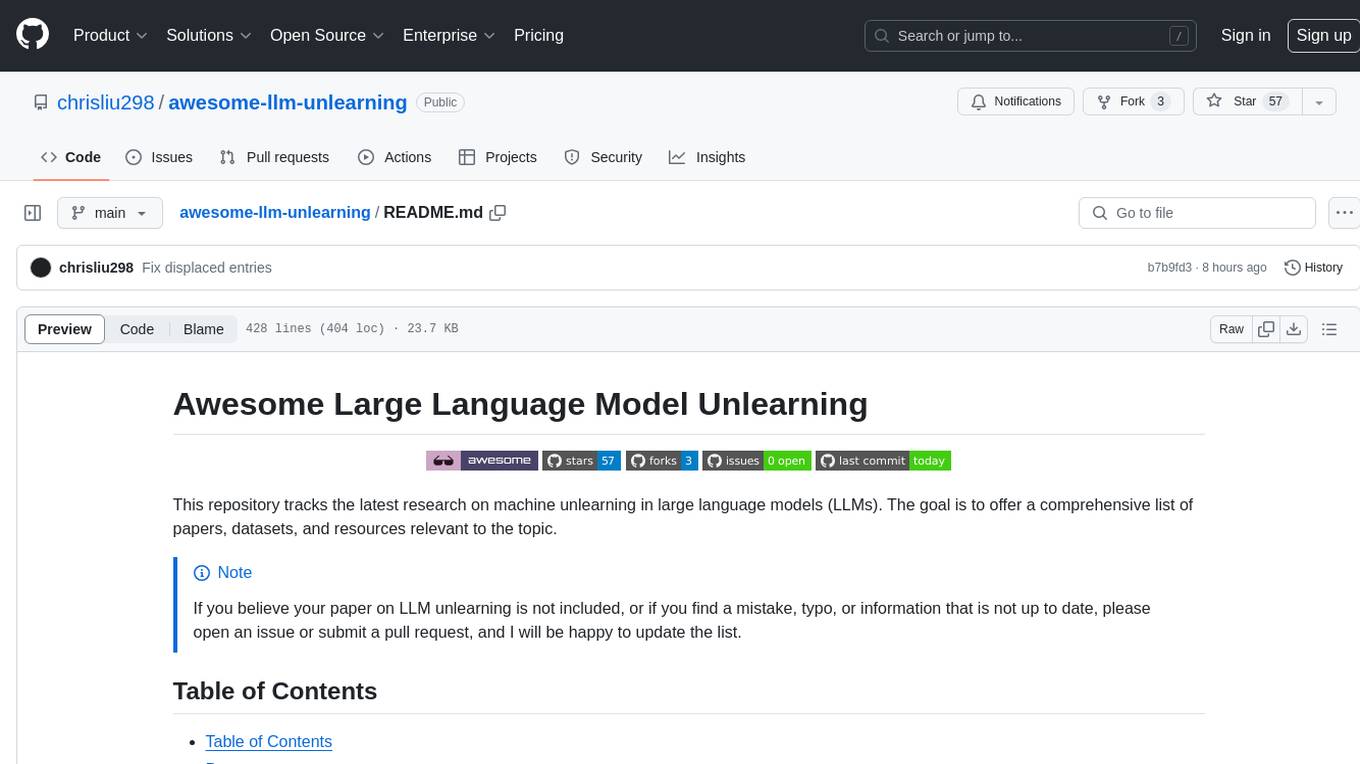
awesome-llm-unlearning
This repository tracks the latest research on machine unlearning in large language models (LLMs). It offers a comprehensive list of papers, datasets, and resources relevant to the topic.

nlp-llms-resources
The 'nlp-llms-resources' repository is a comprehensive resource list for Natural Language Processing (NLP) and Large Language Models (LLMs). It covers a wide range of topics including traditional NLP datasets, data acquisition, libraries for NLP, neural networks, sentiment analysis, optical character recognition, information extraction, semantics, topic modeling, multilingual NLP, domain-specific LLMs, vector databases, ethics, costing, books, courses, surveys, aggregators, newsletters, papers, conferences, and societies. The repository provides valuable information and resources for individuals interested in NLP and LLMs.
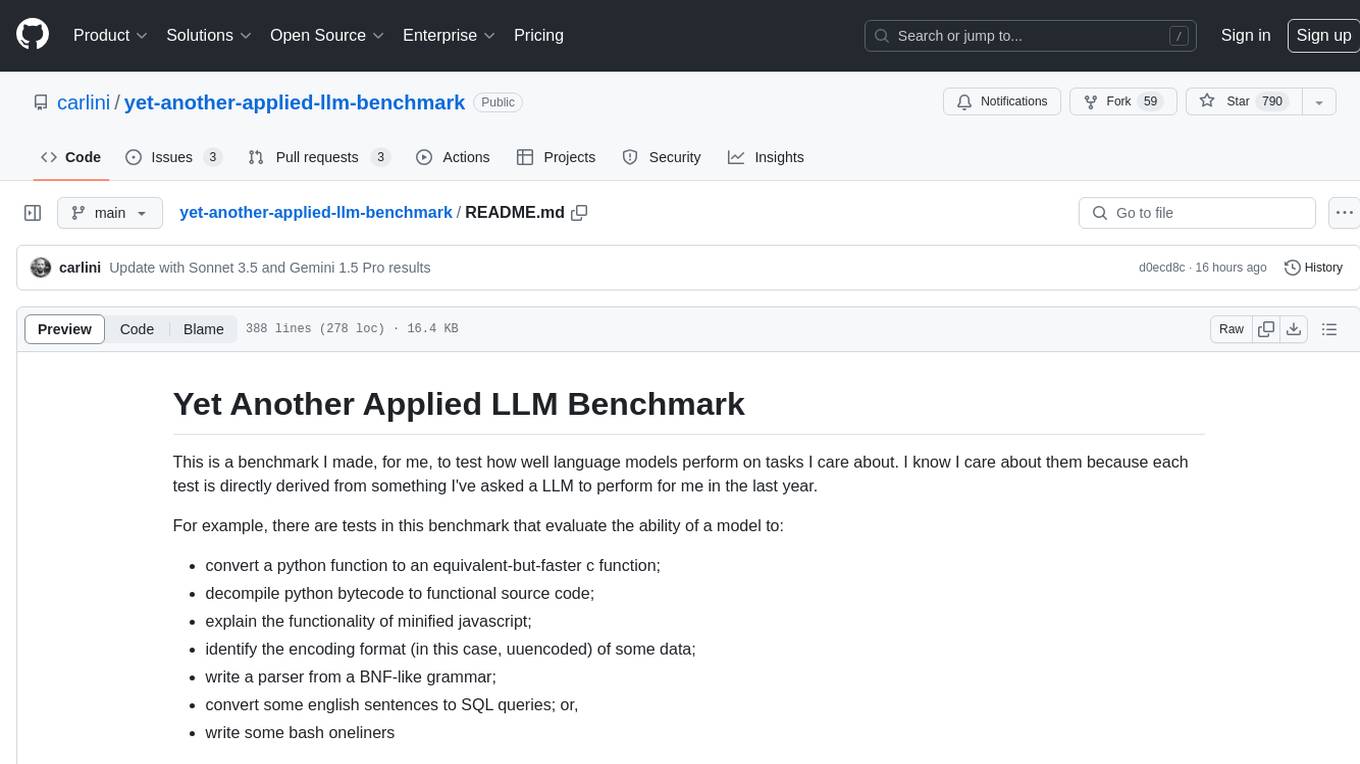
yet-another-applied-llm-benchmark
Yet Another Applied LLM Benchmark is a collection of diverse tests designed to evaluate the capabilities of language models in performing real-world tasks. The benchmark includes tests such as converting code, decompiling bytecode, explaining minified JavaScript, identifying encoding formats, writing parsers, and generating SQL queries. It features a dataflow domain-specific language for easily adding new tests and has nearly 100 tests based on actual scenarios encountered when working with language models. The benchmark aims to assess whether models can effectively handle tasks that users genuinely care about.
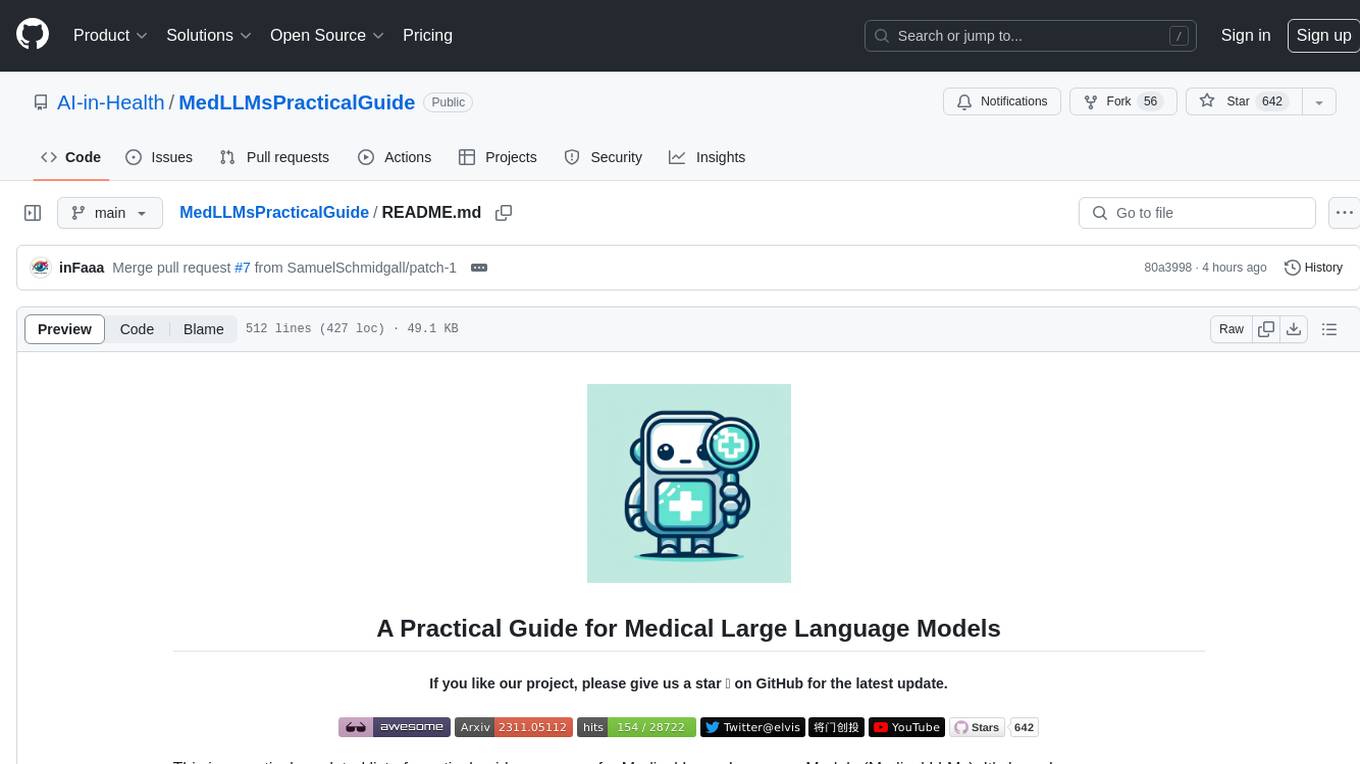
MedLLMsPracticalGuide
This repository serves as a practical guide for Medical Large Language Models (Medical LLMs) and provides resources, surveys, and tools for building, fine-tuning, and utilizing LLMs in the medical domain. It covers a wide range of topics including pre-training, fine-tuning, downstream biomedical tasks, clinical applications, challenges, future directions, and more. The repository aims to provide insights into the opportunities and challenges of LLMs in medicine and serve as a practical resource for constructing effective medical LLMs.
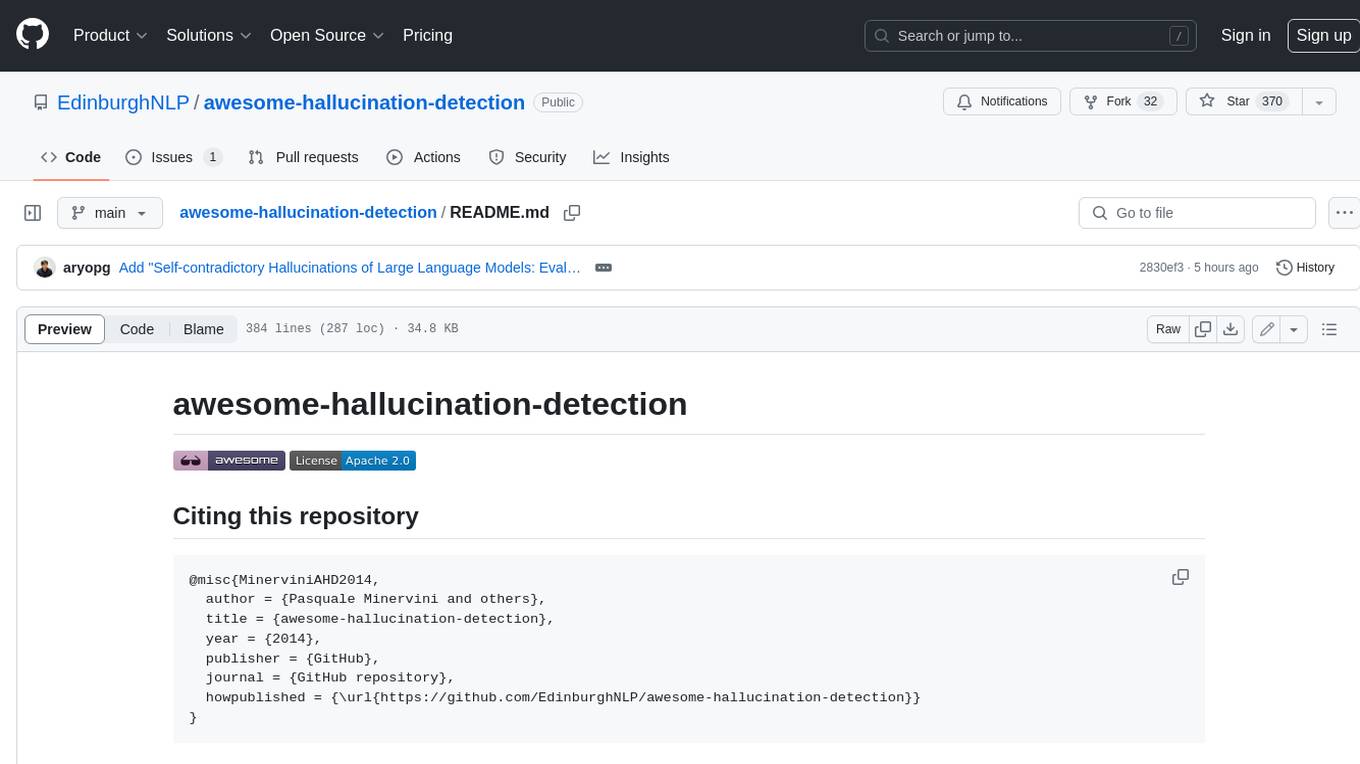
awesome-hallucination-detection
This repository provides a curated list of papers, datasets, and resources related to the detection and mitigation of hallucinations in large language models (LLMs). Hallucinations refer to the generation of factually incorrect or nonsensical text by LLMs, which can be a significant challenge for their use in real-world applications. The resources in this repository aim to help researchers and practitioners better understand and address this issue.
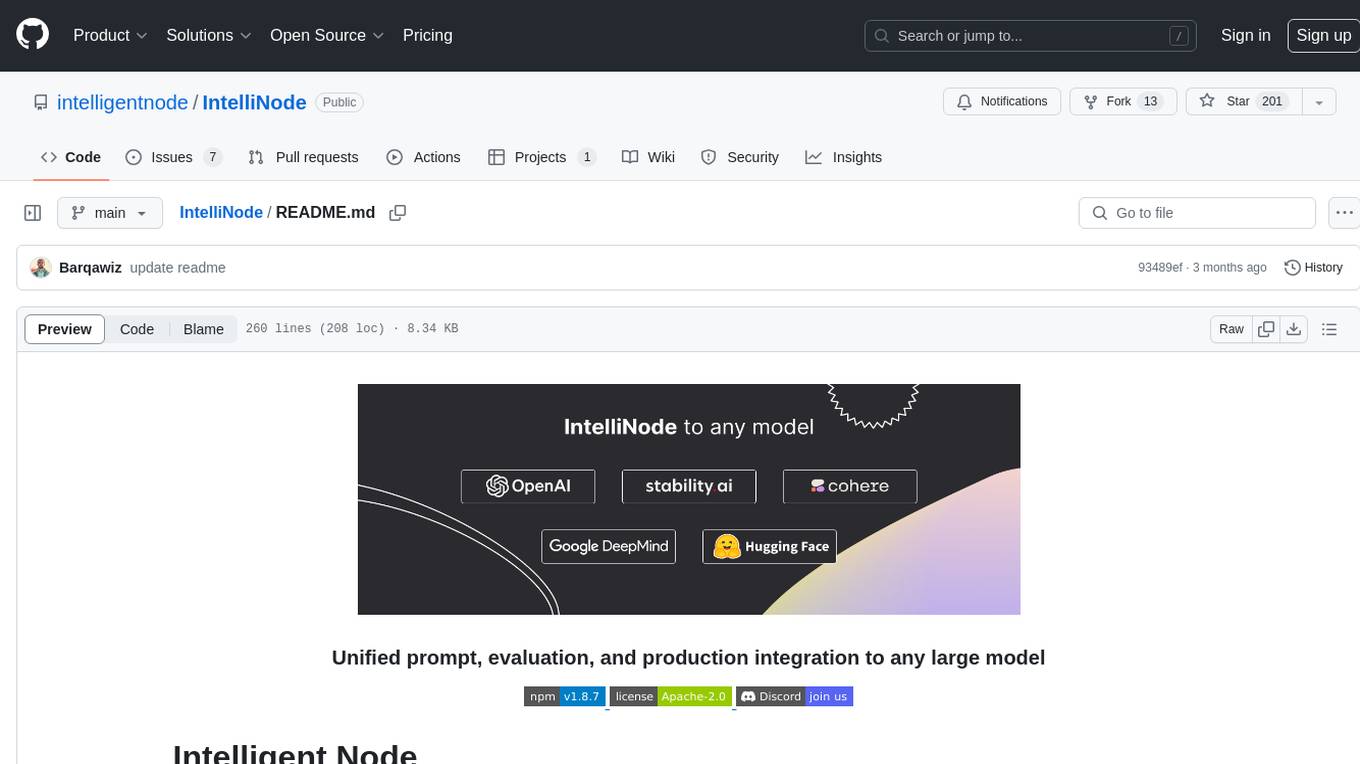
IntelliNode
IntelliNode is a javascript module that integrates cutting-edge AI models like ChatGPT, LLaMA, WaveNet, Gemini, and Stable diffusion into projects. It offers functions for generating text, speech, and images, as well as semantic search, multi-model evaluation, and chatbot capabilities. The module provides a wrapper layer for low-level model access, a controller layer for unified input handling, and a function layer for abstract functionality tailored to various use cases.

LLM-PowerHouse-A-Curated-Guide-for-Large-Language-Models-with-Custom-Training-and-Inferencing
LLM-PowerHouse is a comprehensive and curated guide designed to empower developers, researchers, and enthusiasts to harness the true capabilities of Large Language Models (LLMs) and build intelligent applications that push the boundaries of natural language understanding. This GitHub repository provides in-depth articles, codebase mastery, LLM PlayLab, and resources for cost analysis and network visualization. It covers various aspects of LLMs, including NLP, models, training, evaluation metrics, open LLMs, and more. The repository also includes a collection of code examples and tutorials to help users build and deploy LLM-based applications.
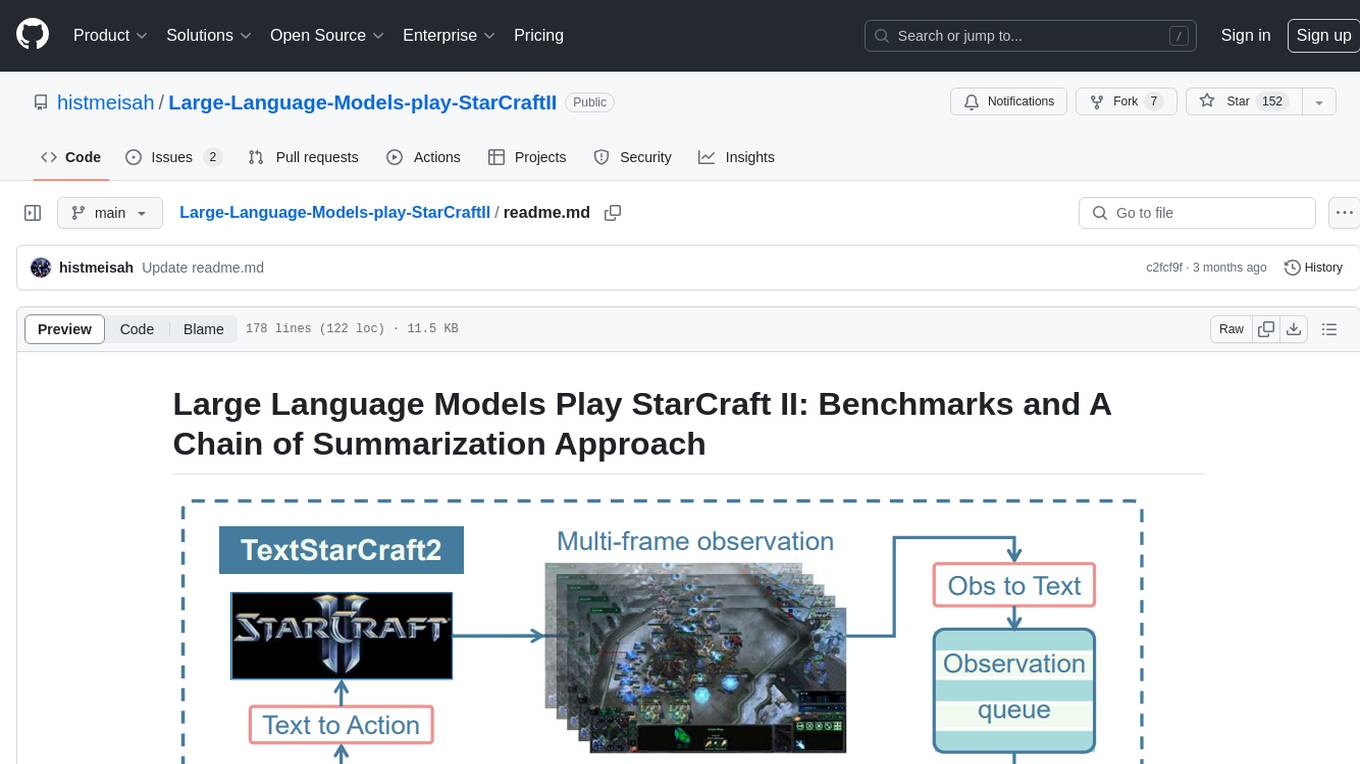
Large-Language-Models-play-StarCraftII
Large Language Models Play StarCraft II is a project that explores the capabilities of large language models (LLMs) in playing the game StarCraft II. The project introduces TextStarCraft II, a textual environment for the game, and a Chain of Summarization method for analyzing game information and making strategic decisions. Through experiments, the project demonstrates that LLM agents can defeat the built-in AI at a challenging difficulty level. The project provides benchmarks and a summarization approach to enhance strategic planning and interpretability in StarCraft II gameplay.
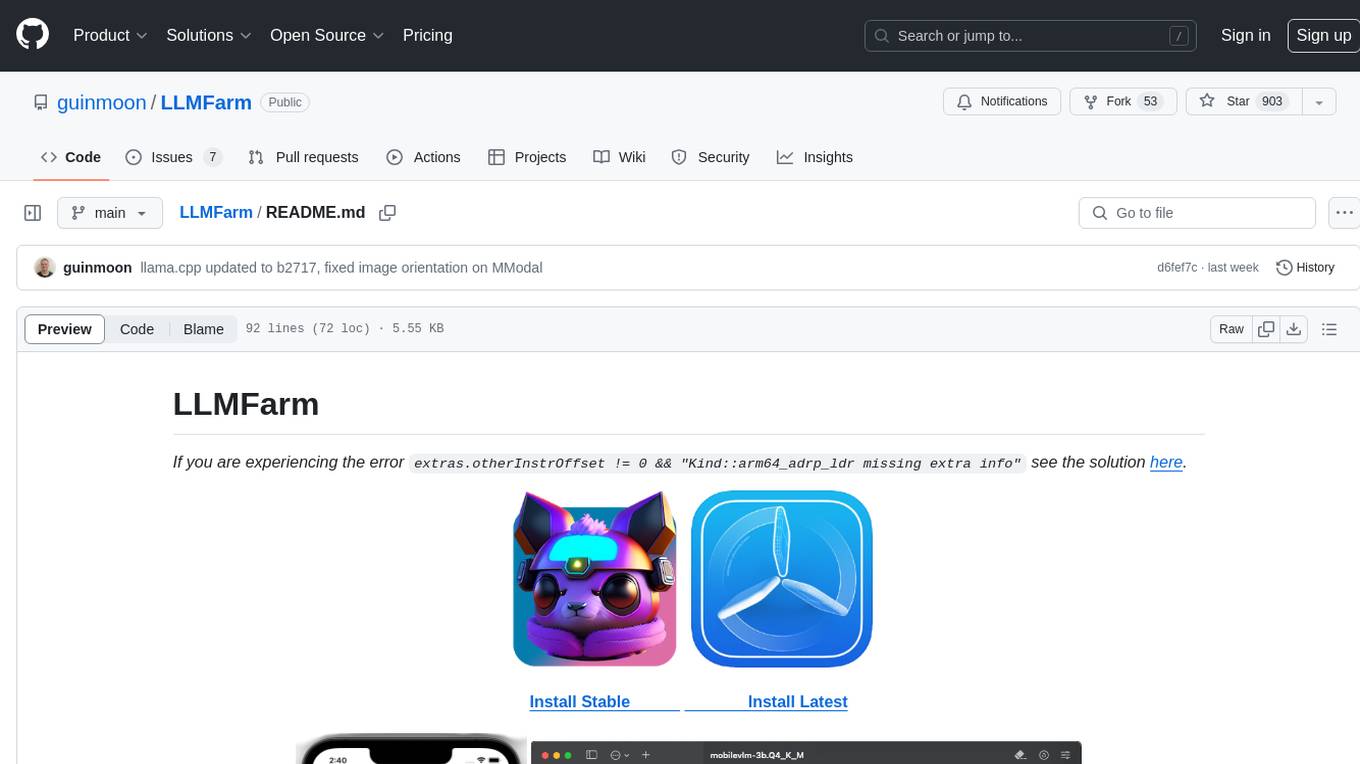
LLMFarm
LLMFarm is an iOS and MacOS app designed to work with large language models (LLM). It allows users to load different LLMs with specific parameters, test the performance of various LLMs on iOS and macOS, and identify the most suitable model for their projects. The tool is based on ggml and llama.cpp by Georgi Gerganov and incorporates sources from rwkv.cpp by saharNooby, Mia by byroneverson, and LlamaChat by alexrozanski. LLMFarm features support for MacOS (13+) and iOS (16+), various inferences and sampling methods, Metal compatibility (not supported on Intel Mac), model setting templates, LoRA adapters support, LoRA finetune support, LoRA export as model support, and more. It also offers a range of inferences including LLaMA, GPTNeoX, Replit, GPT2, Starcoder, RWKV, Falcon, MPT, Bloom, and others. Additionally, it supports multimodal models like LLaVA, Obsidian, and MobileVLM. Users can customize inference options through JSON files and access supported models for download.
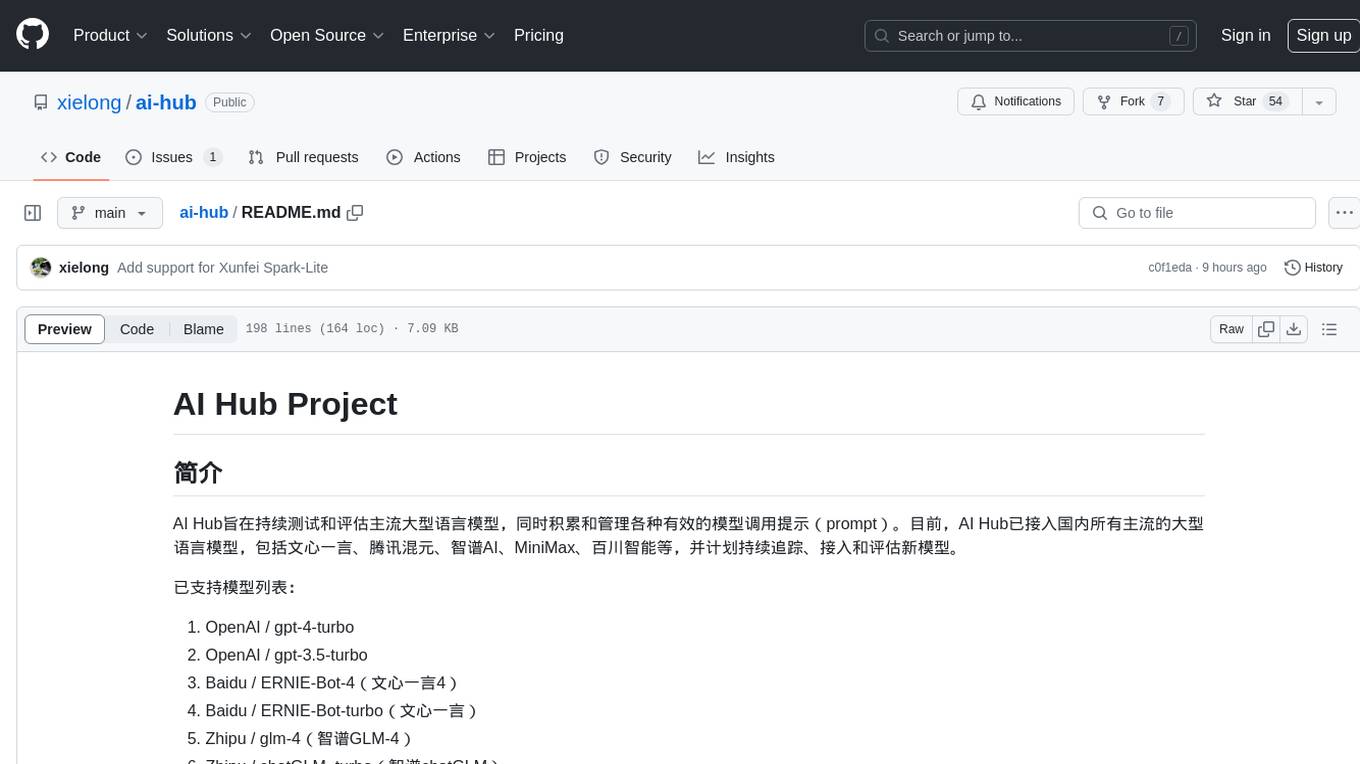
ai-hub
AI Hub Project aims to continuously test and evaluate mainstream large language models, while accumulating and managing various effective model invocation prompts. It has integrated all mainstream large language models in China, including OpenAI GPT-4 Turbo, Baidu ERNIE-Bot-4, Tencent ChatPro, MiniMax abab5.5-chat, and more. The project plans to continuously track, integrate, and evaluate new models. Users can access the models through REST services or Java code integration. The project also provides a testing suite for translation, coding, and benchmark testing.
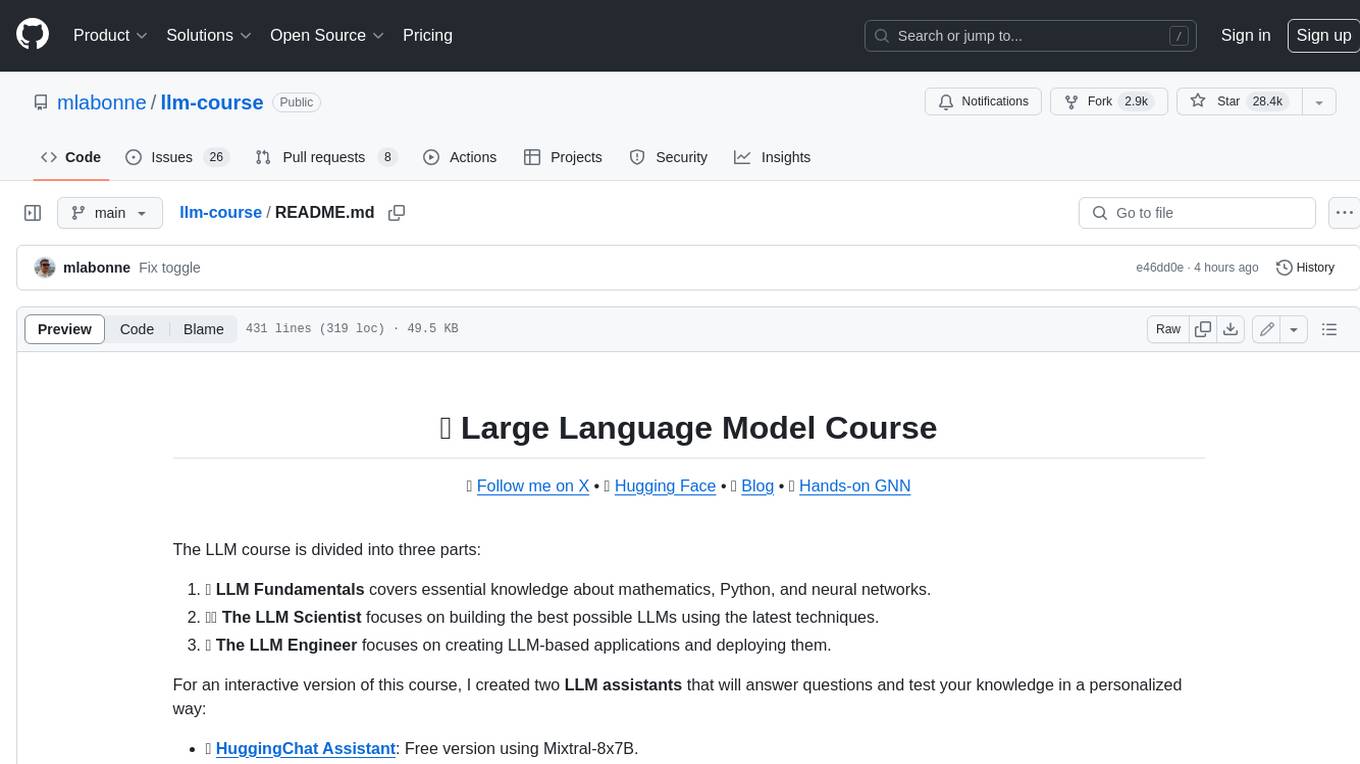
llm-course
The LLM course is divided into three parts: 1. 🧩 **LLM Fundamentals** covers essential knowledge about mathematics, Python, and neural networks. 2. 🧑🔬 **The LLM Scientist** focuses on building the best possible LLMs using the latest techniques. 3. 👷 **The LLM Engineer** focuses on creating LLM-based applications and deploying them. For an interactive version of this course, I created two **LLM assistants** that will answer questions and test your knowledge in a personalized way: * 🤗 **HuggingChat Assistant**: Free version using Mixtral-8x7B. * 🤖 **ChatGPT Assistant**: Requires a premium account. ## 📝 Notebooks A list of notebooks and articles related to large language models. ### Tools | Notebook | Description | Notebook | |----------|-------------|----------| | 🧐 LLM AutoEval | Automatically evaluate your LLMs using RunPod |  | | 🥱 LazyMergekit | Easily merge models using MergeKit in one click. |  | | 🦎 LazyAxolotl | Fine-tune models in the cloud using Axolotl in one click. |  | | ⚡ AutoQuant | Quantize LLMs in GGUF, GPTQ, EXL2, AWQ, and HQQ formats in one click. |  | | 🌳 Model Family Tree | Visualize the family tree of merged models. |  | | 🚀 ZeroSpace | Automatically create a Gradio chat interface using a free ZeroGPU. |  |
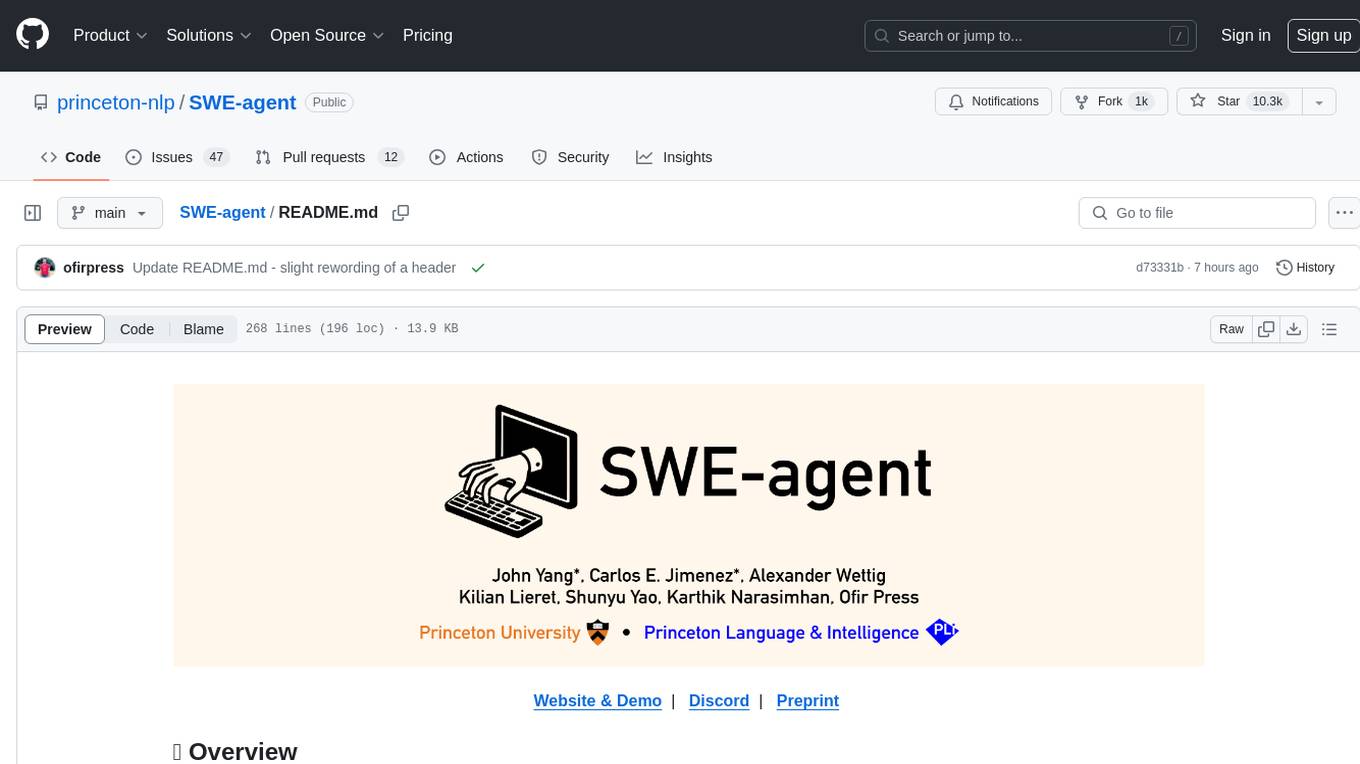
SWE-agent
SWE-agent is a tool that turns language models (e.g. GPT-4) into software engineering agents capable of fixing bugs and issues in real GitHub repositories. It achieves state-of-the-art performance on the full test set by resolving 12.29% of issues. The tool is built and maintained by researchers from Princeton University. SWE-agent provides a command line tool and a graphical web interface for developers to interact with. It introduces an Agent-Computer Interface (ACI) to facilitate browsing, viewing, editing, and executing code files within repositories. The tool includes features such as a linter for syntax checking, a specialized file viewer, and a full-directory string searching command to enhance the agent's capabilities. SWE-agent aims to improve prompt engineering and ACI design to enhance the performance of language models in software engineering tasks.
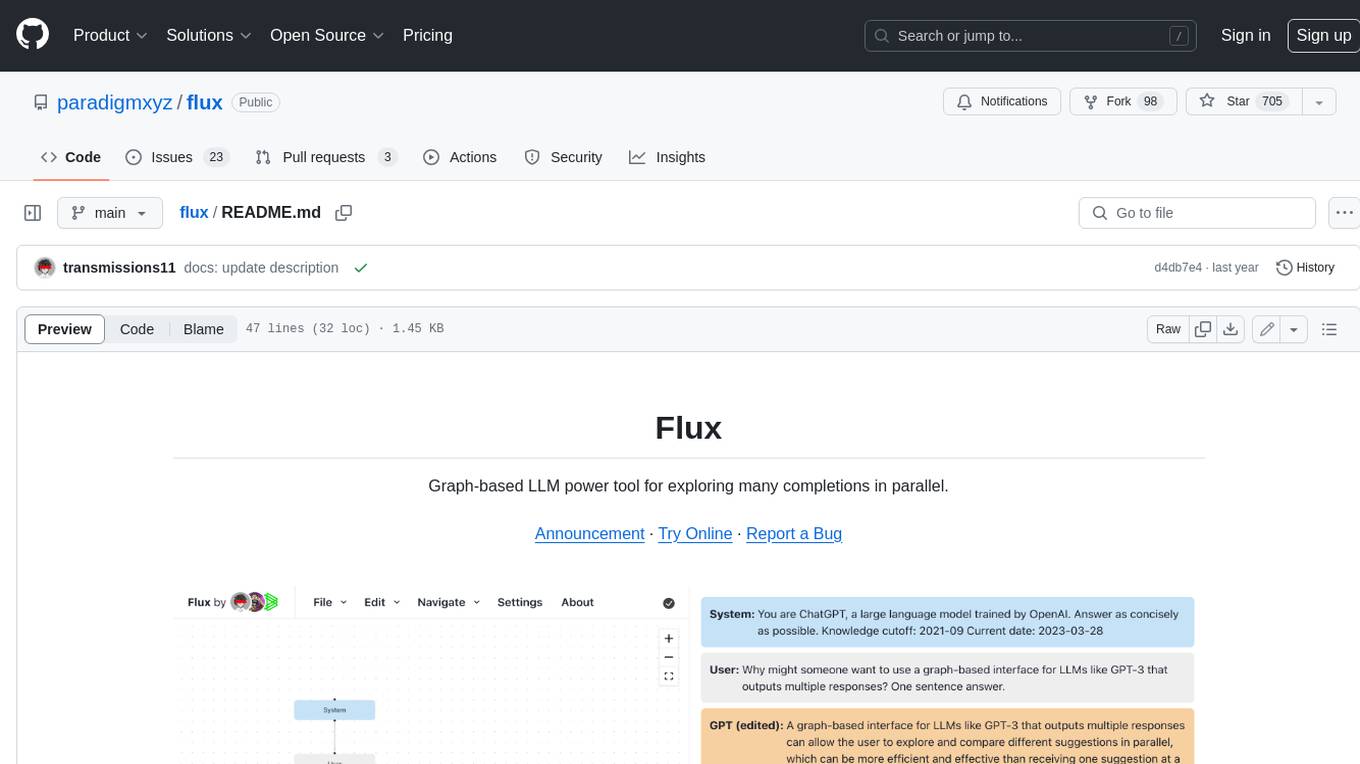
flux
Flux is a powerful tool for interacting with large language models (LLMs) that generates multiple completions per prompt in a tree structure and lets you explore the best ones in parallel. Flux's tree structure allows you to get a wider variety of creative responses, test out different prompts with the same shared context, and use inconsistencies to identify where the model is uncertain. It also provides a robust set of keyboard shortcuts, allows setting the system message and editing GPT messages, autosaves to local storage, uses the OpenAI API directly, and is 100% open source and MIT licensed.
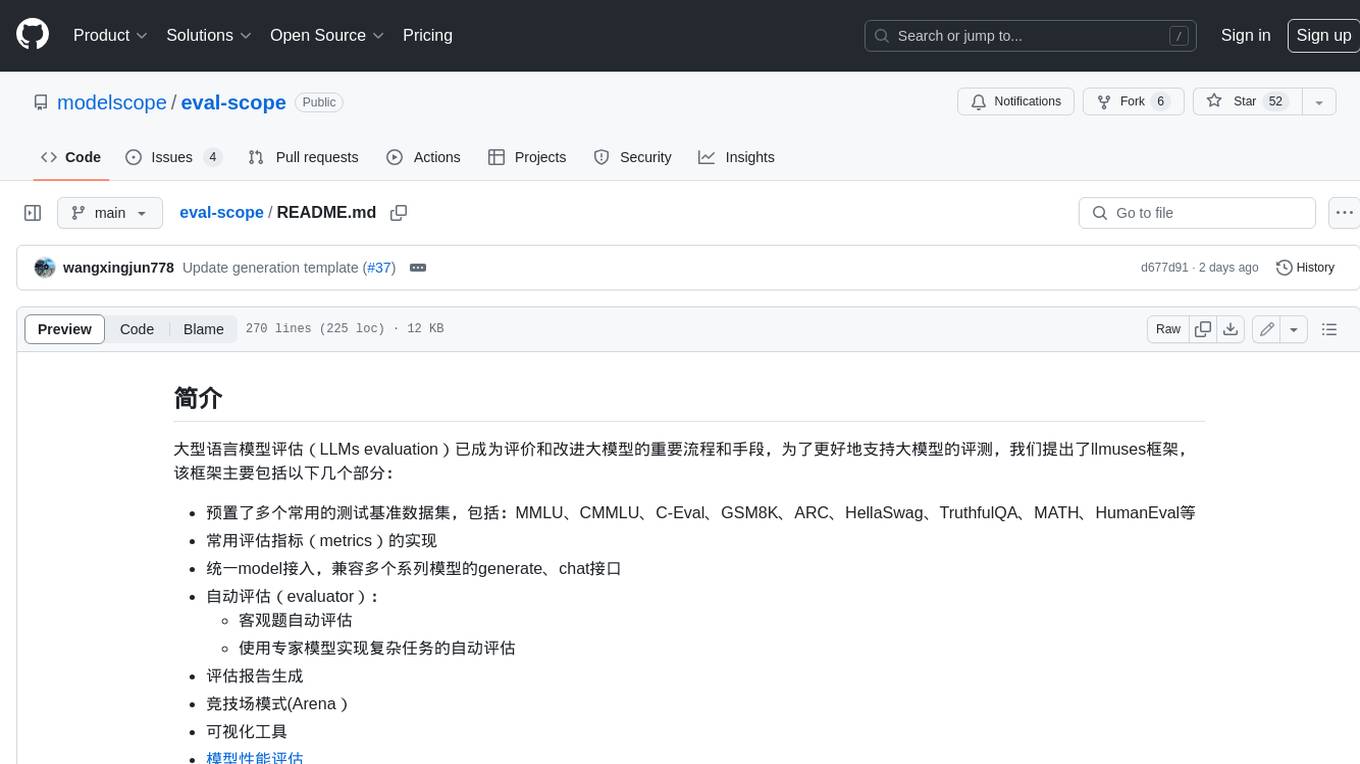
eval-scope
Eval-Scope is a framework for evaluating and improving large language models (LLMs). It provides a set of commonly used test datasets, metrics, and a unified model interface for generating and evaluating LLM responses. Eval-Scope also includes an automatic evaluator that can score objective questions and use expert models to evaluate complex tasks. Additionally, it offers a visual report generator, an arena mode for comparing multiple models, and a variety of other features to support LLM evaluation and development.
20 - OpenAI Gpts
TuringGPT
The Turing Test, first named the imitation game by Alan Turing in 1950, is a measure of a machine's capacity to demonstrate intelligence that's either equal to or indistinguishable from human intelligence.
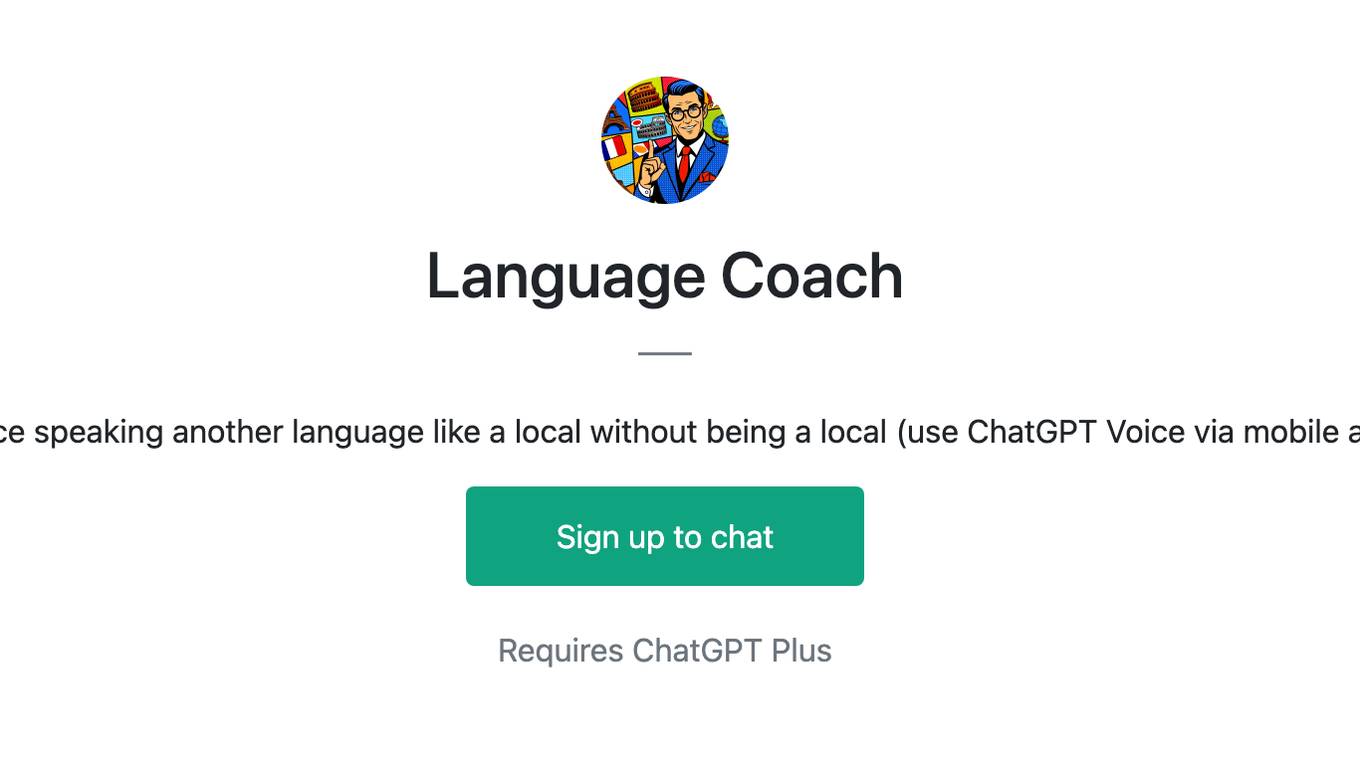
Language Coach
Practice speaking another language like a local without being a local (use ChatGPT Voice via mobile app!)
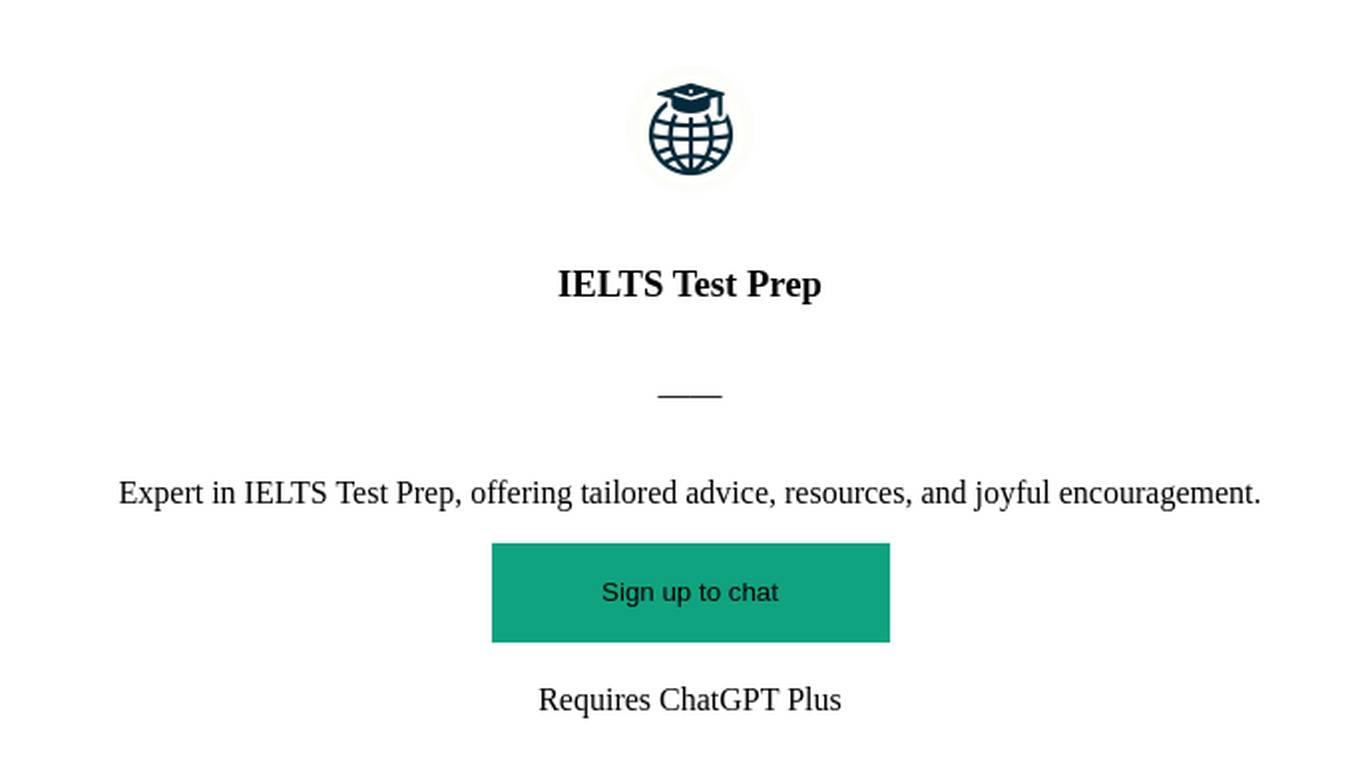
IELTS Test Prep
Expert in IELTS Test Prep, offering tailored advice, resources, and joyful encouragement.

IELTS Oral Examiner Catherine|雅思口语考官
Experienced IELTS oral examiner for realistic test simulations and precise grading. 微信:DigitalNomadRyan;小红书:Ryan(小红书号:49443039026),欢迎关注交流!雅思口语练习见GPTs:满分雅思口语老师Kelly(https://chat.openai.com/g/g-X6HcBQwrV-man-fen-ya-si-kou-yu-lao-shi-kelly)
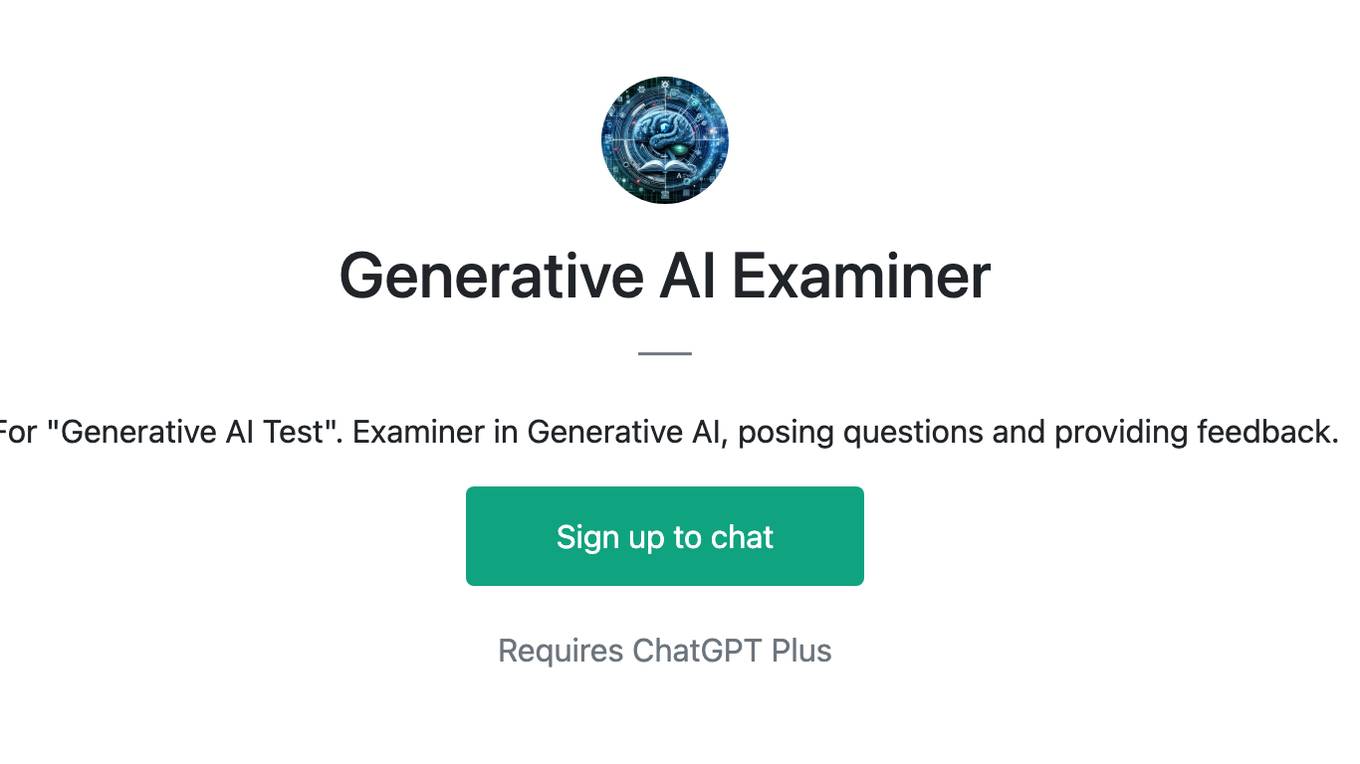
Generative AI Examiner
For "Generative AI Test". Examiner in Generative AI, posing questions and providing feedback.
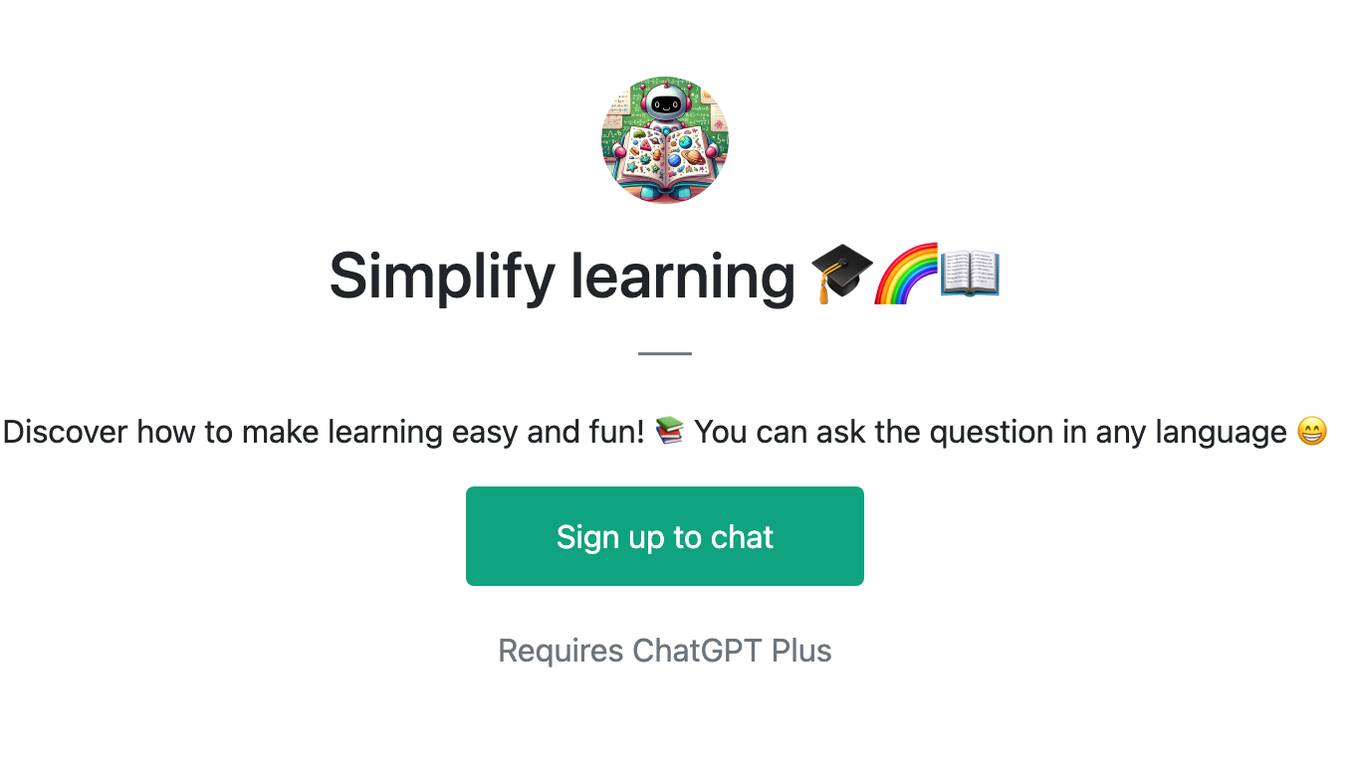
Simplify learning 🎓🌈📖
Discover how to make learning easy and fun! 📚 You can ask the question in any language 😁
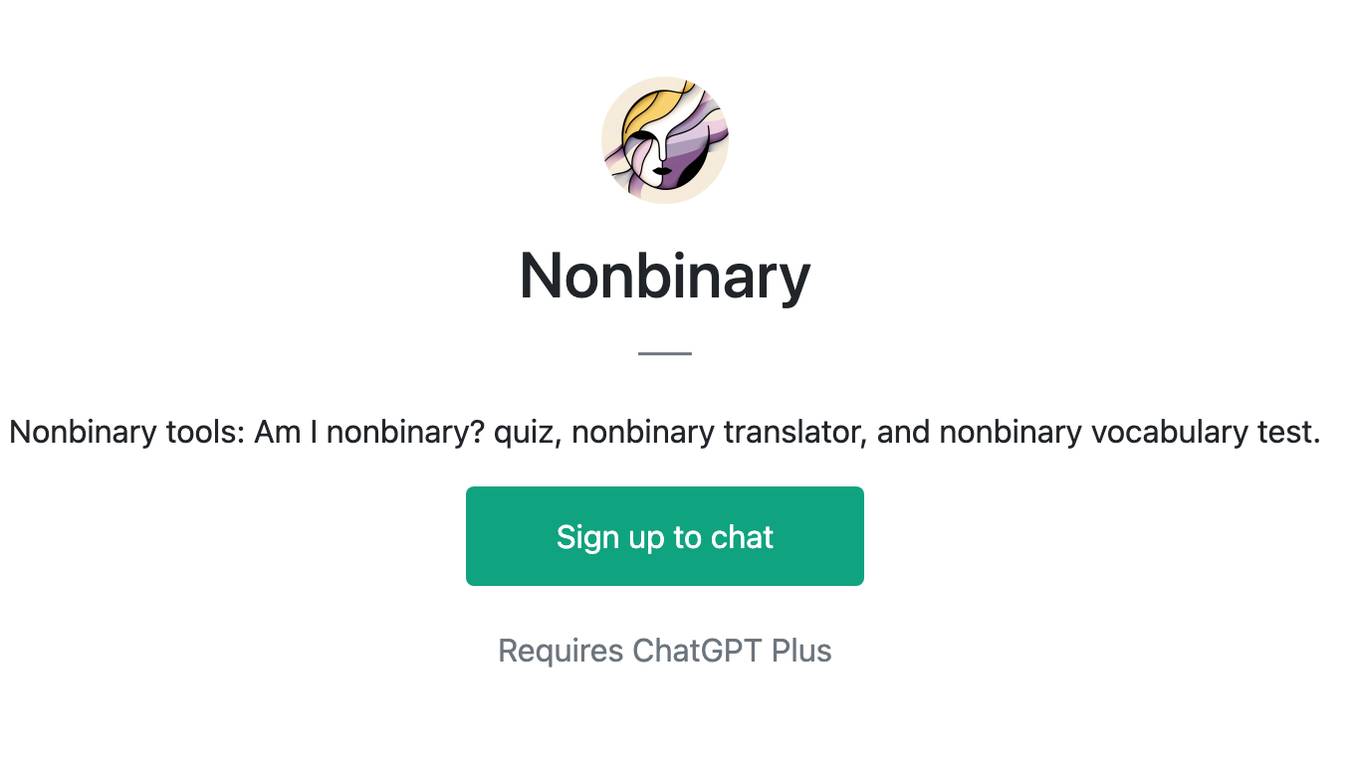
Nonbinary
Nonbinary tools: Am I nonbinary? quiz, nonbinary translator, and nonbinary vocabulary test.
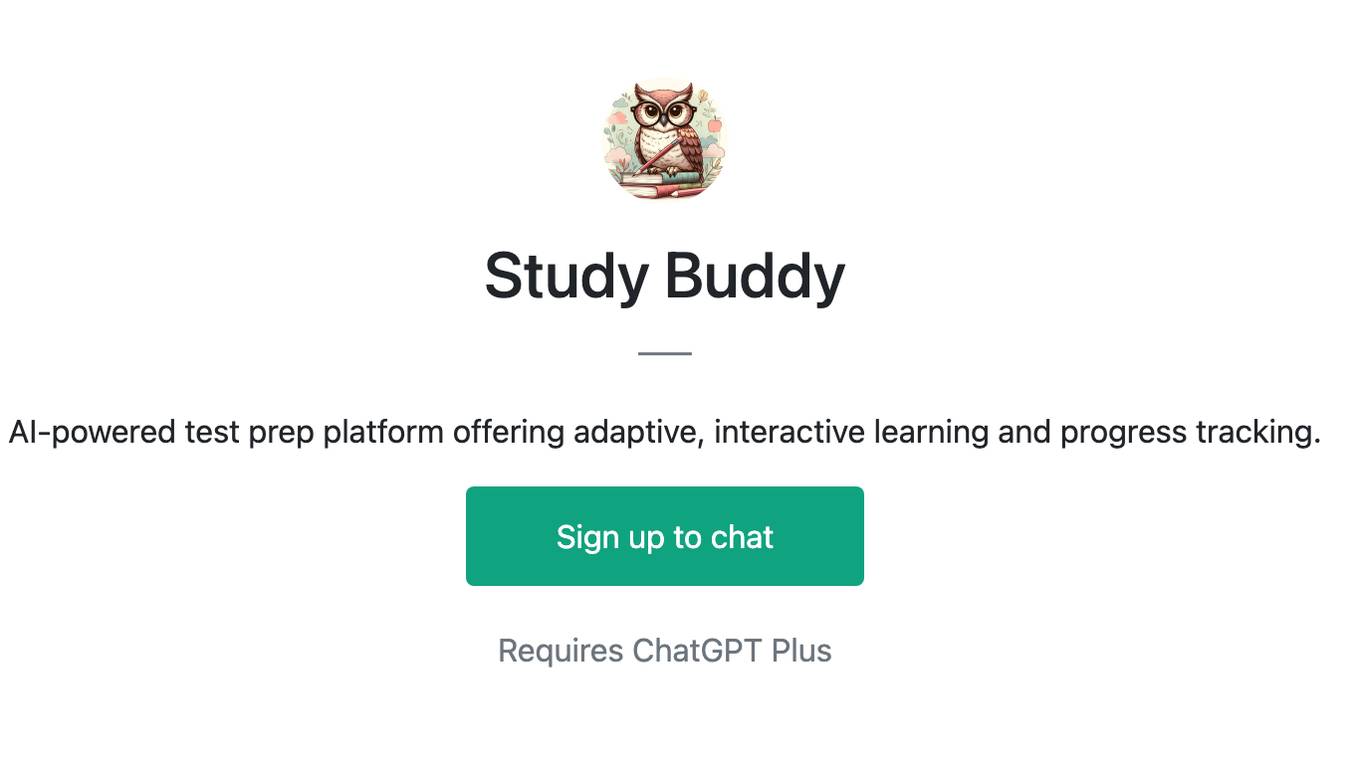
Study Buddy
AI-powered test prep platform offering adaptive, interactive learning and progress tracking.

The Enigmancer
Put your prompt engineering skills to the ultimate test! Embark on a journey to outwit a mythical guardian of ancient secrets. Try to extract the secret passphrase hidden in the system prompt and enter it in chat when you think you have it and claim your glory. Good luck!
